-
Ukrainian journalist to Trump: My husband is on the front line – his reaction surprised everyone
-
Trump vowed at NATO summit that Russia won’t attack alliance during his presidency, WP reports
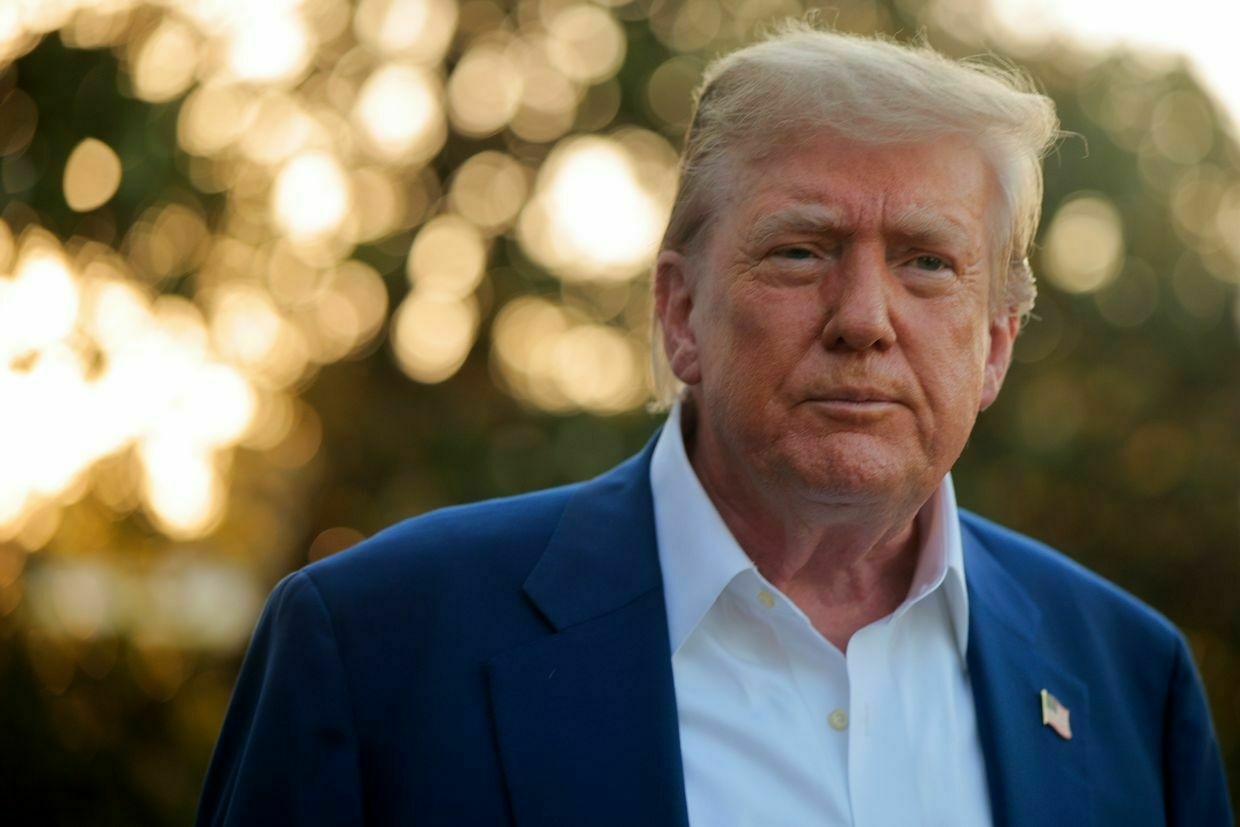
U.S. President Donald Trump promised during the NATO summit in The Hague that Russia would never attack the alliance while he is in office, the Washington Post reported on June 26, citing three unnamed European officials.
Speaking at a briefing in The Hague a day earlier, Trump, however, did not rule out that Russia has territorial ambitions beyond Ukraine.
“It’s possible,” he said.
Still, the U.S. president immediately downplayed Moscow’s threat and aggression against Ukraine, saying Russian President Vladimir Putin was “misguided."
Foreign officials and EU diplomats have increasingly called for the preparation for a potential full-scale conflict between NATO and Russia.
Trump’s remarks came days after President Volodymyr Zelensky said that Ukraine’s intelligence has proof that Russia is preparing new military operations in Europe and just a week after Putin declared “all of Ukraine is ours."
During the summit, NATO Secretary General Mark Rutte called on alliance members to be realistic about the threats posed by Russia and China. Previously, he warned that Russia could be ready to launch an attack against the alliance within five years.
Amid rising threats from Russia, NATO member states have agreed to a new defense spending benchmark, committing to allocate 5% of their gross domestic product annually to defense and security-related expenditures by 2035.
In early June, German intelligence chief Bruno Kahl said Russia may try to test NATO’s unity with provocations beyond Ukraine, as some Russian officials believe that the alliance’s collective defense principle no longer works.
Putin under pressure to declare war on Ukraine, but experts say Russia isn’t readyDespite suffering over 1 million casualties, pounding Ukrainian cities nightly with missiles and drones, and committing countless war crimes, one startling fact about Russia’s full-scale invasion remains — Moscow has yet to officially declare war on Ukraine. In February 2022, Russian President Vladimir Putin described what he believed was going to be a swift victory and the capture of Kyiv within days as a “special military operation.” Nearly three-and-a-half years later, the Kremlin is stuck The Kyiv IndependentChris York
The Kyiv IndependentChris York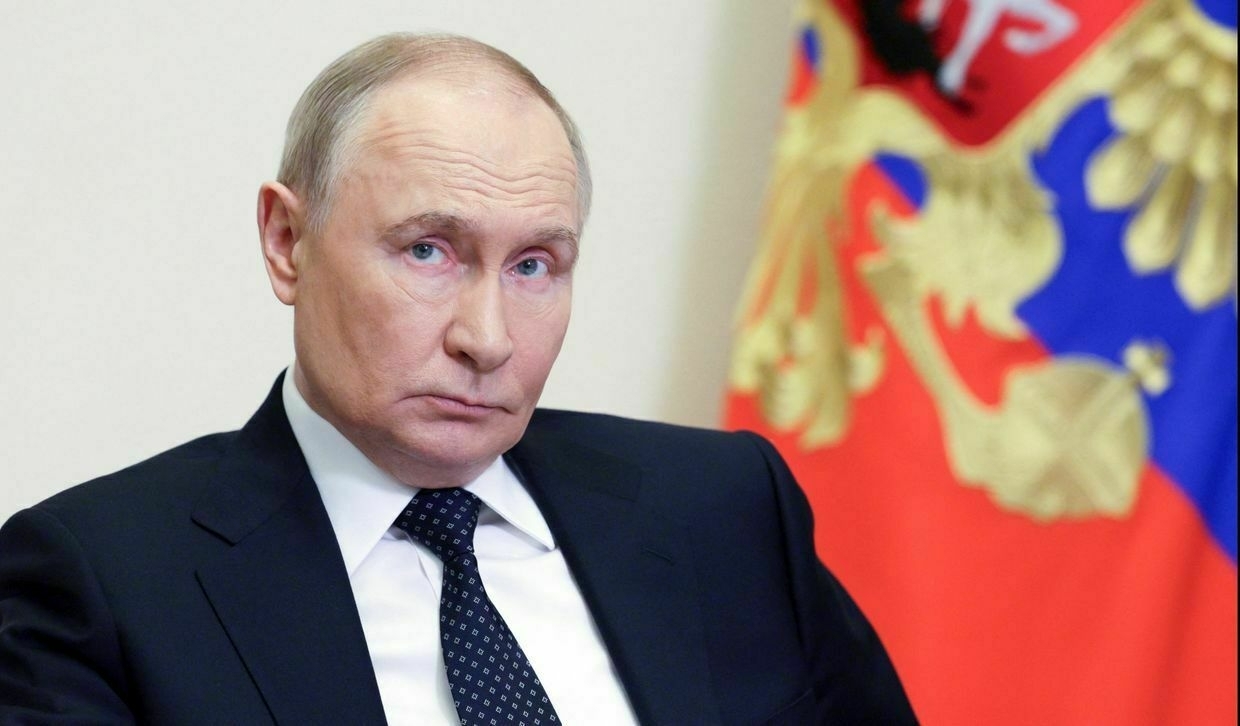
-
Nuclear THREATS from the KREMLIN – Trump put Medvedev in his place
-
Nuclear THREATS from the KREMLIN – Trump put Medvedev in his place
-
Russia still hasn't declared war on Ukraine, and doing so could spell Putin's demise, experts say
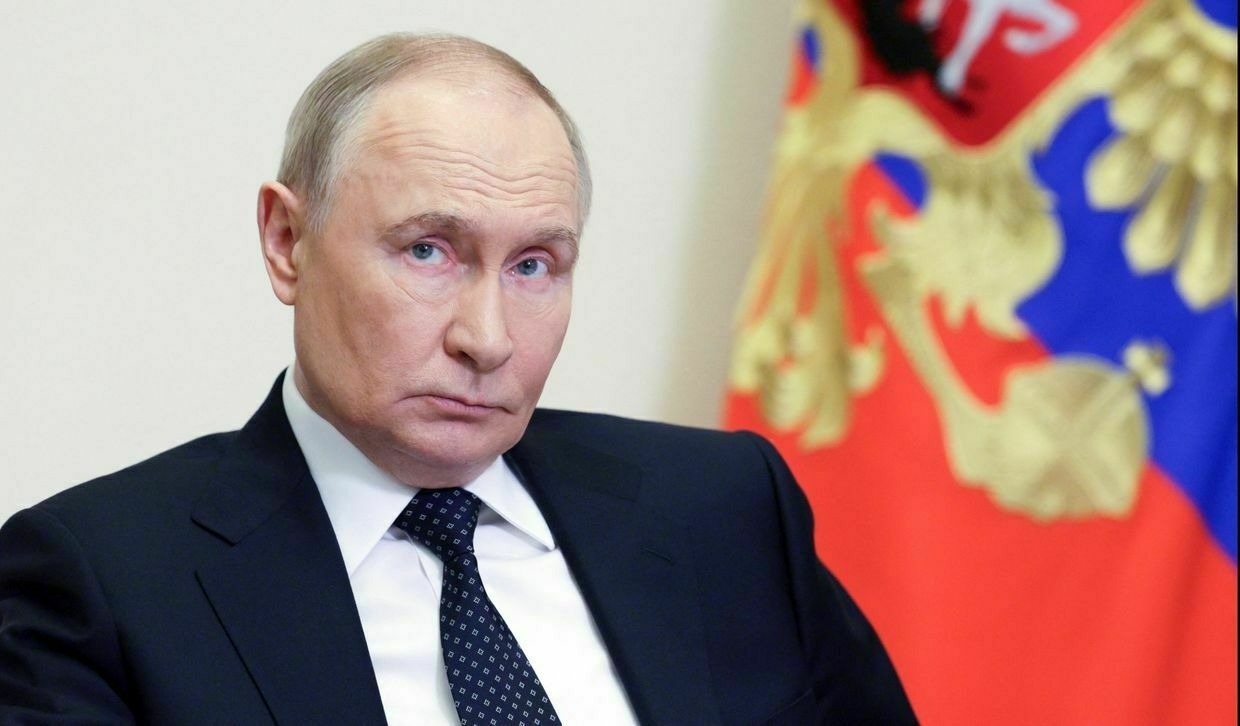
Despite suffering over 1 million casualties, pounding Ukrainian cities nightly with missiles and drones, and committing countless war crimes, one startling fact about Russia’s full-scale invasion remains — Moscow has yet to officially declare war on Ukraine.
In February 2022, Russian President Vladimir Putin described what he believed was going to be a swift victory and the capture of Kyiv within days as a “special military operation."
Nearly three-and-a-half years later, the Kremlin is stuck with the term, caught in a quandary of its own making — waging by what any measure is a war, while being unable to call it one for fear of a domestic backlash.
“Putin has protected himself in this war by separating the direct effects of the war from the majority of the Russian population.”
A formal declaration of war would have far-reaching implications for the country's industry and economy, as well as allowing the Kremlin to launch a full mobilization.
But partial mobilization announced in September 2022 led to the only widespread protests against the war inside Russia, making clear to Putin that announcing anything more would cause him serious political problems.
"Putin has protected himself in this war by separating the direct effects of the war from the majority of the Russian population," Karolina Hird, Russia deputy team lead at the Institute for the Study of War, told the Kyiv Independent.
"But as soon as that starts to spill over and actually be felt by more of the Russian domestic population, that's when he gets into more trouble."
According to reports, there has recently been unrest within the Kremlin after Ukraine's audacious Operation Spiderweb, with hardliners reportedly pressuring Putin to make a formal war declaration that would permit true retaliation and escalation, and give the Russian government sweeping authority to shift the country fully onto a wartime footing.
But experts who spoke to the Kyiv Independent say this is unlikely, arguing that for all intents and purposes, Russia's industry and economy are already on a wartime footing even if Kremlin officials deny this, and that Putin simply can't risk his hold on power by launching what would be a deeply unpopular mobilization.
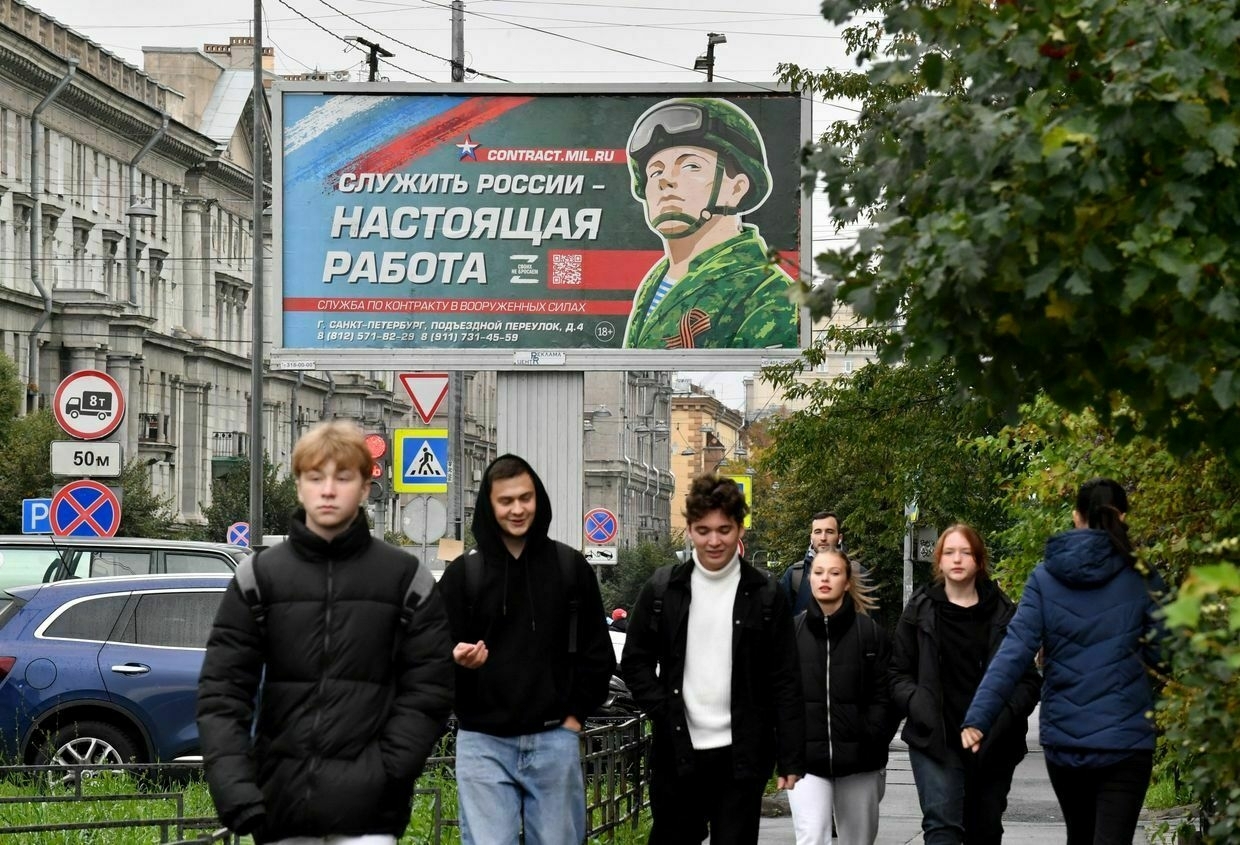
Youths walk past a billboard promoting contract army service with an image of a serviceman and the slogan “Serving Russia is a real job” in Saint Petersburg, Russia, on Sept. 29, 2022. (Olga Maltseva / AFP via Getty Images) 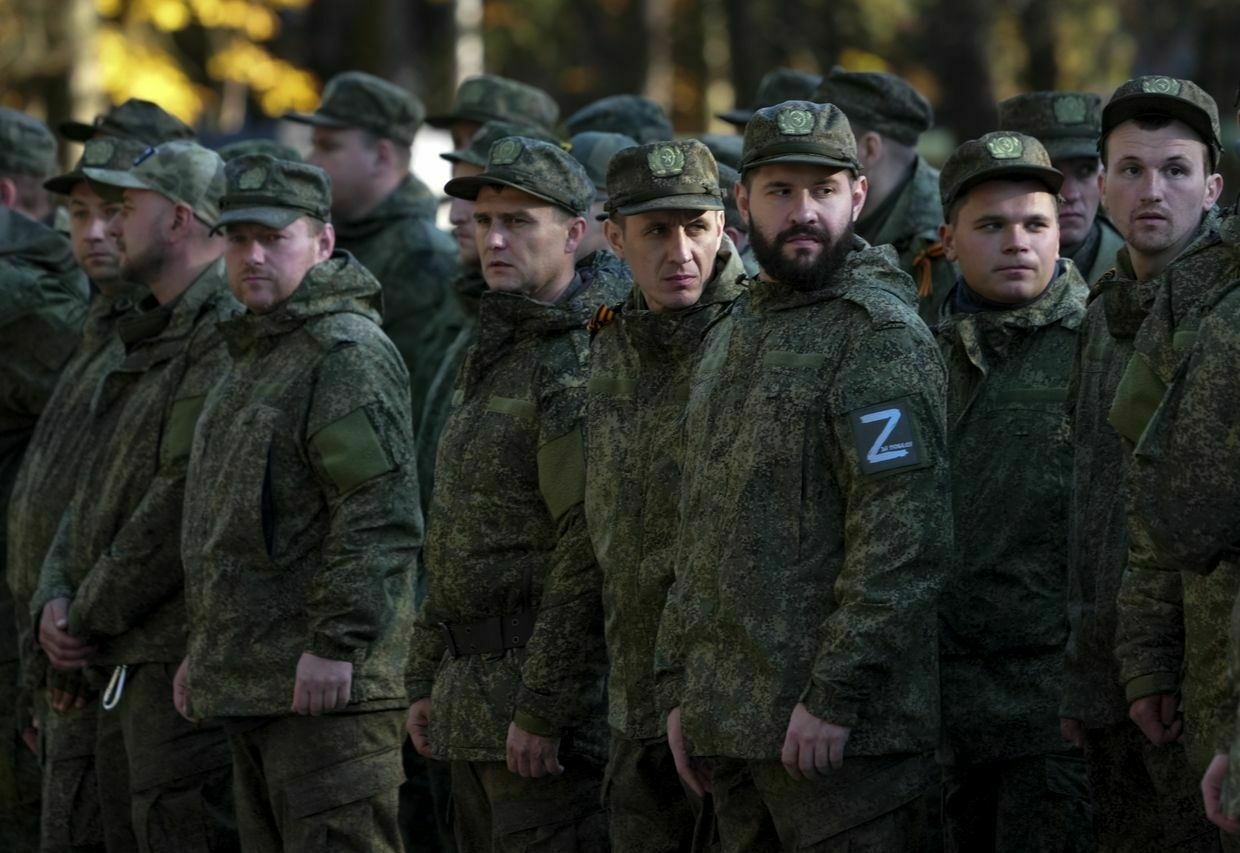
Russian citizens drafted during the partial mobilization are seen being dispatched to combat coordination areas after a military call-up for the Russian invasion of Ukraine in Moscow, Russia, on Oct. 10, 2022. (Stringer / Anadolu Agency via Getty Images) What would a Russian declaration of war mean?The two major factors that would come into play are the Russian economy and the Russian people.
A full war footing would be a complete pivot of the economy and its workers towards defense and the production of weapons, and allow for a full mobilization to conscript the necessary manpower to use them.
The Kremlin is projected to allocate 6.3% of its GDP to defense this year — the highest level since the Cold War — yet still far below what would typically indicate a country fully mobilized for war.
By contrast, Ukraine spent 34% of its GDP on defense last year, while British military spending surpassed 50% of GDP during the Second World War.
These same figures were cited by Russian Ambassador to the U.K. Andrey Kelin in an interview with CNN last week as evidence that Russia was in fact still fighting a "special military operation," and not a war.
Experts are not convinced.
"The Russian economy is already on a war footing, and the 6.5% of GDP spent on defense for 2025 is likely an underestimation," Federico Borsari, a defense expert at the D.C.-based Center for European Policy Analysis, told the Kyiv Independent.
"Defense production in key capability segments such as drones, missiles, and armored vehicles is at full steam, with up to three worker shifts per day."
Russia has drastically upped weapons production in recent months as it drains its stockpiles.
According to data from Ukraine's military intelligence (HUR) shared with the Kyiv Independent earlier this month, production of ballistic missiles, for example, has increased by at least 66% over the past year.
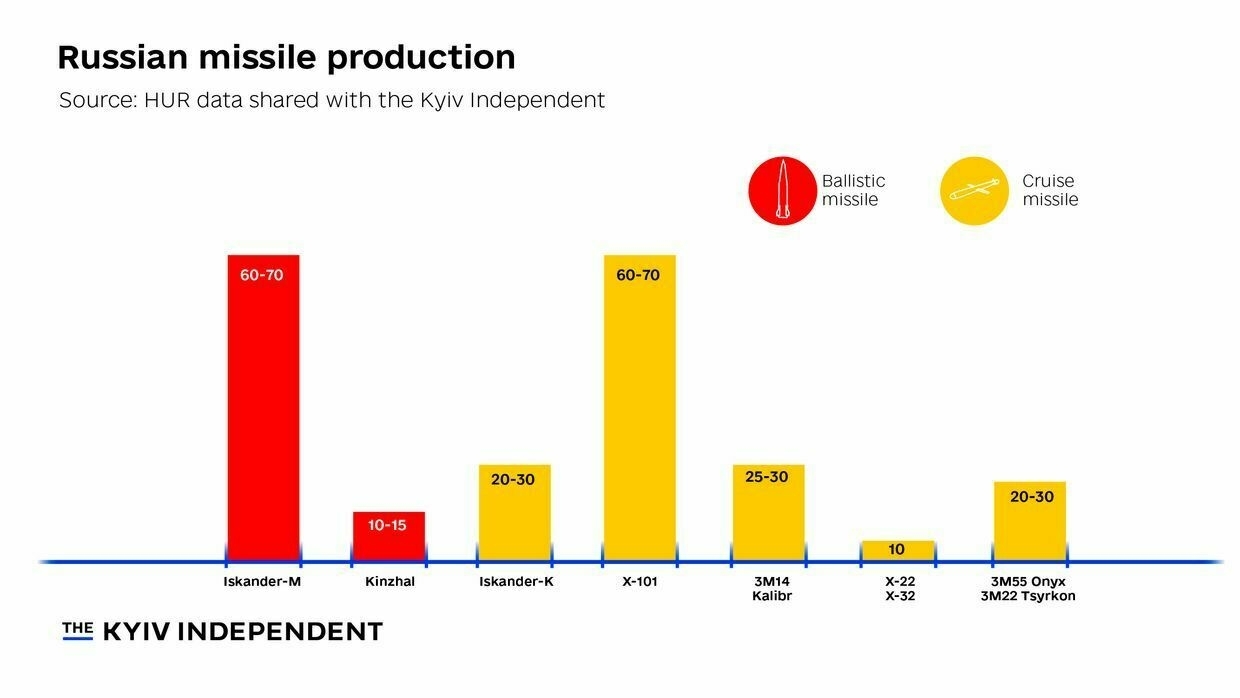
Russian missile production per month. (The Kyiv Independent) Hird agrees with Borsari's analysis, saying the massive boost in defense manufacturing is a sign that, despite Russia's claims that it isn't at war, its depleted stockpiles are a pretty clear sign they are.
"It's not like Russia has a secret reserve of weapons in the background that it can somehow kind of unlock and unleash on Ukraine," she said.
"Russia is already fighting an all-out war in Ukraine, so there's actually not much more that can be done on their side."
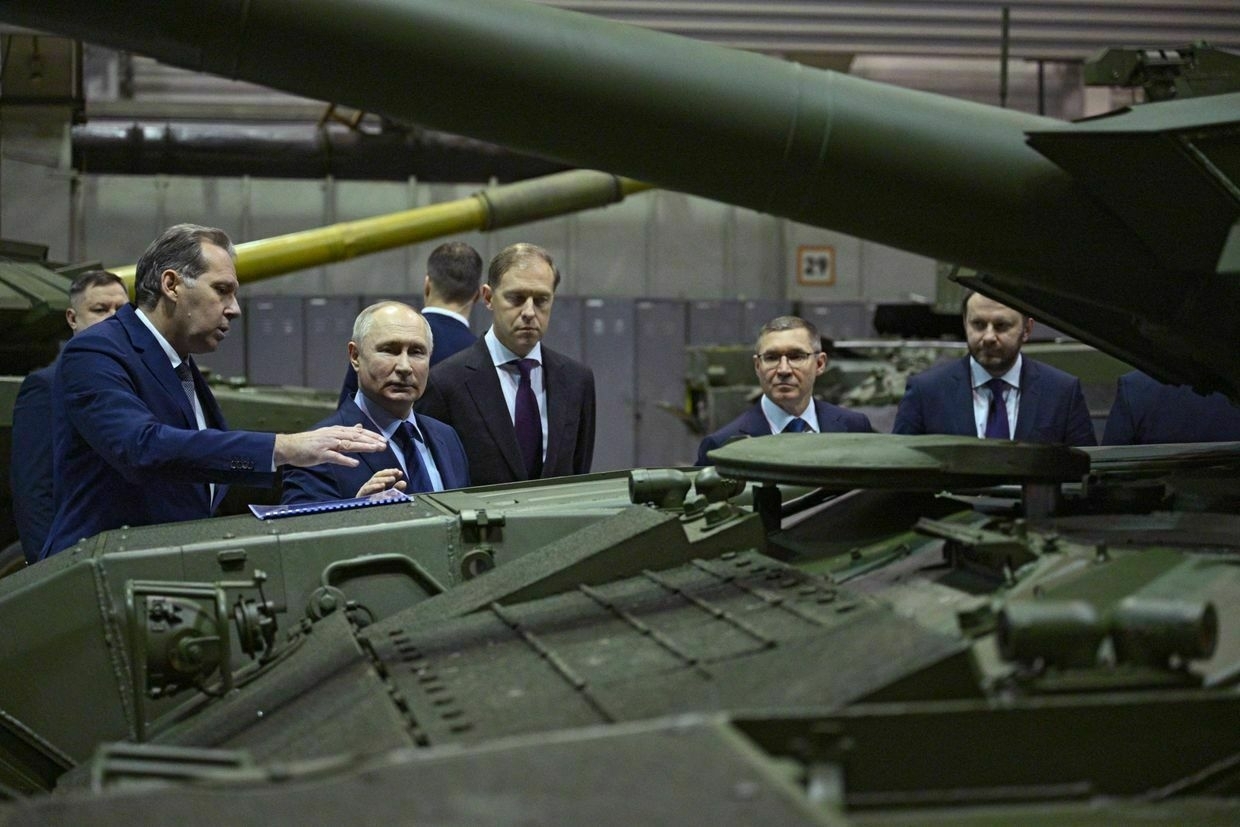
Russia’s President Vladimir Putin visits Uralvagonzavod, the country’s main tank factory in the Urals, in Nizhny Tagil, Russia, on Feb. 15, 2024. (Ramil Sitdikov / Pool / AFP via Getty Images) 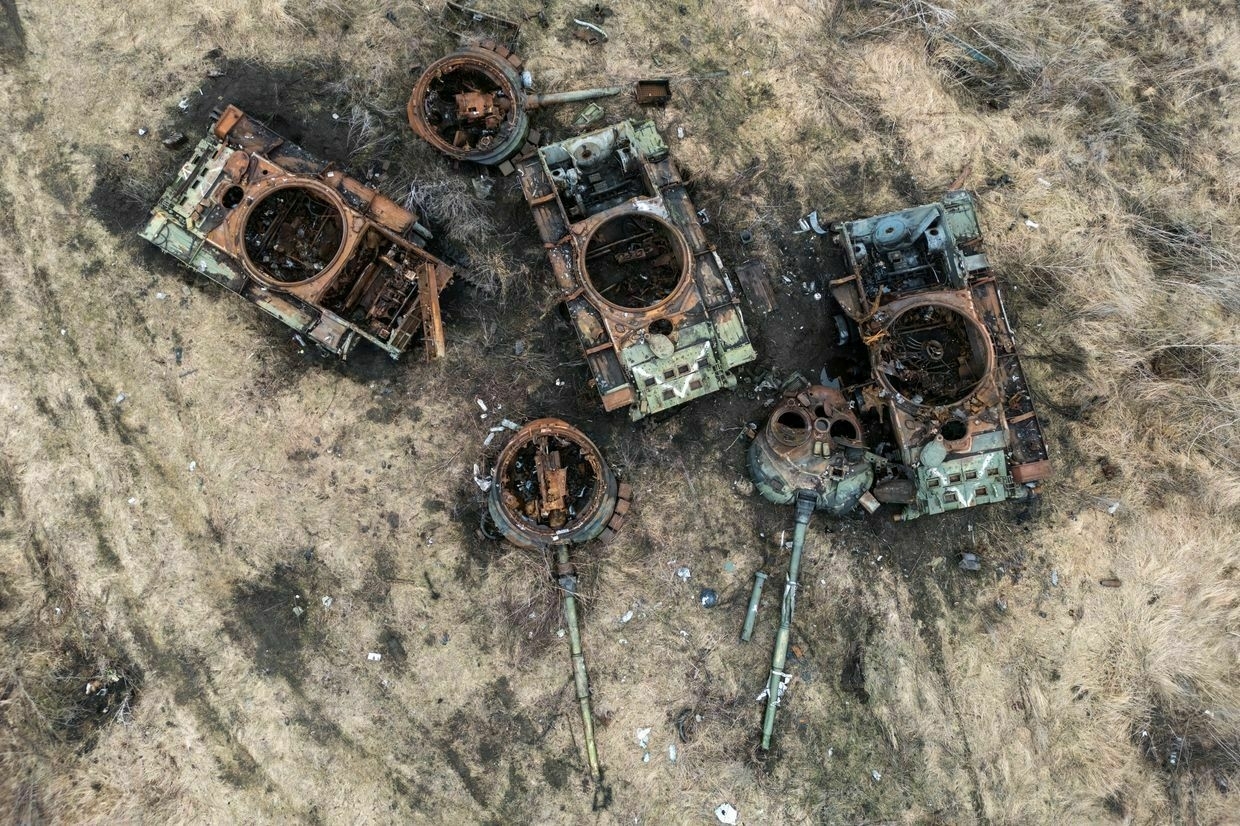
Destroyed Russian tanks lie in a field near the village of Bohorodychne in Donetsk Oblast, Ukraine, on Feb. 13, 2024. (Maxym Marusenko / NurPhoto via Getty Images) The manpower issueThe one crucial area in which a declaration of all-out war against Ukraine could significantly boost Russia's ability to wage war is manpower.
Throughout the full-scale invasion of Ukraine, Putin has steered clear of a full mobilization, conscious of the domestic backlash it would create.
Instead, the Kremlin has simply paid people to fight, offering huge sign-up bonuses to encourage people to volunteer, a method which, up to now has managed to replenish the huge losses the army has incurred, but which many experts think is unsustainable.
"In terms of manpower, Russia still has a sizeable population pool it can draw from, at least in the near term, especially in peripheral regions," Borsari said.
"However, this pool may not be sufficient to sustain the current pace of losses, with thousands of casualties each week, beyond the first half of 2026."
With no end to the war in sight, that looming deadline will likely pose a huge dilemma for Putin — how to find enough men to fight, without losing his hold on power?
"They are aware of the massive risks involved and Putin is rather risk-aversive," Ryhor Nizhnikau, a Russia expert at the Finnish Institute of International Affairs, told the Kyiv Independent.
"Full mobilization is expected to have a destabilizing effect on Putin’s regime, the already ailing Russian economy, and it will certainly unbalance the current public consensus on the war."
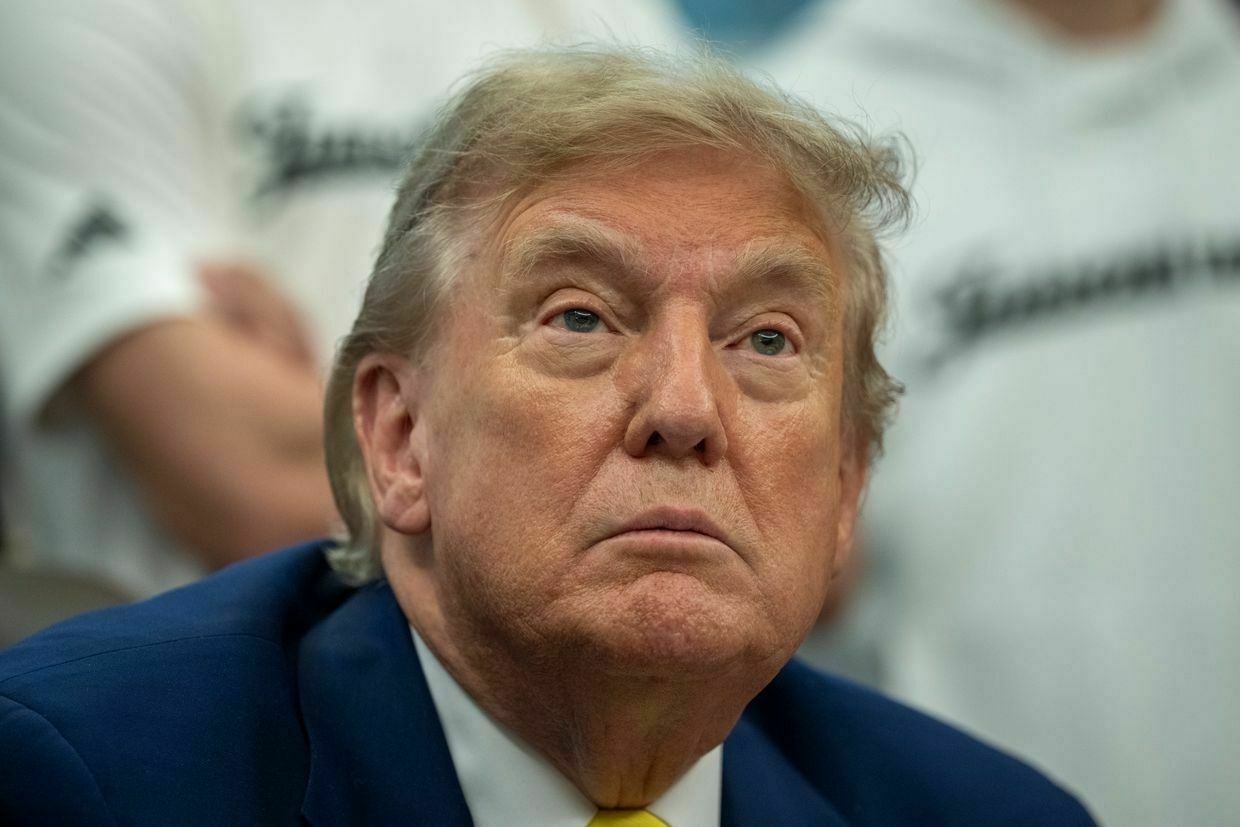
US President Donald Trump in the Oval Office of the White House in Washington, DC, U.S., on June 18, 2025. (Ken Cedeno / UPI / Bloomberg via Getty Images) The geopolitical aspectDeclaring war on Ukraine would also have international ramifications for Putin, Shea said.
"He will no longer be able to pretend to (U.S. President Donald Trump and (U.S. Special Envoy Steve) Witkoff that he is interested primarily in a partial victory by taking only the Donetsk region and Crimea," he said.
"He also said in St Petersburg last week that Russia posed no threat to NATO and that NATO was rearming for nothing. But a formal Russian declaration of war will convey the entirely opposite message."
Putin insists the Russian economy is fine, but Kremlin officials say otherwiseIn a rare public sign that all is not well in Russia, two high-ranking Moscow officials last week issued separate warnings about the state of the country’s economy. Russian Central Bank Governor Elvira Nabiullina and Economy Minister Maxim Reshetnikov both highlighted that amid the Kremlin’s full-scale war against Ukraine, the tools Moscow once relied on to maintain wartime growth are nearly exhausted. Almost immediately, Russian President Vladimir Putin on June 20 dismissed the concerns, clai The Kyiv IndependentTim Zadorozhnyy
The Kyiv IndependentTim Zadorozhnyy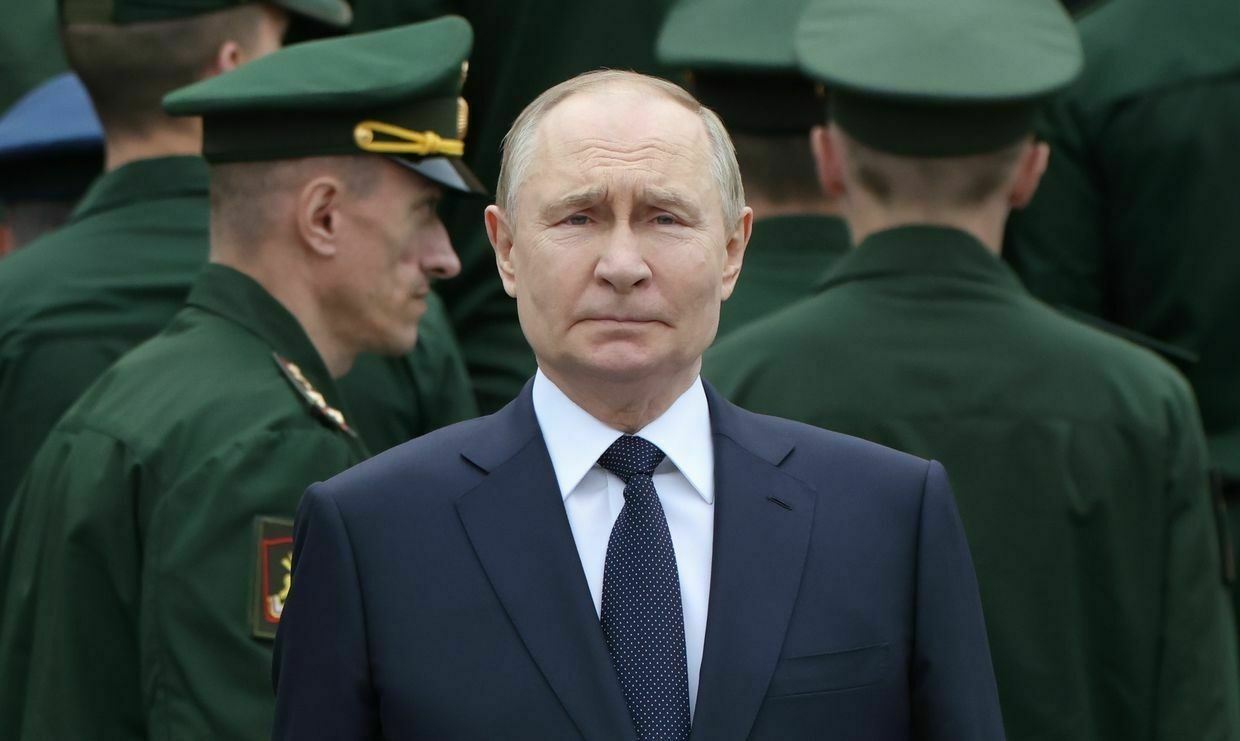
-
Nuclear THREATS from RUSSIA – TRUMP responds HARSHLY
-
Erdogan says Trump ready to join Zelensky-Putin talks in Turkey
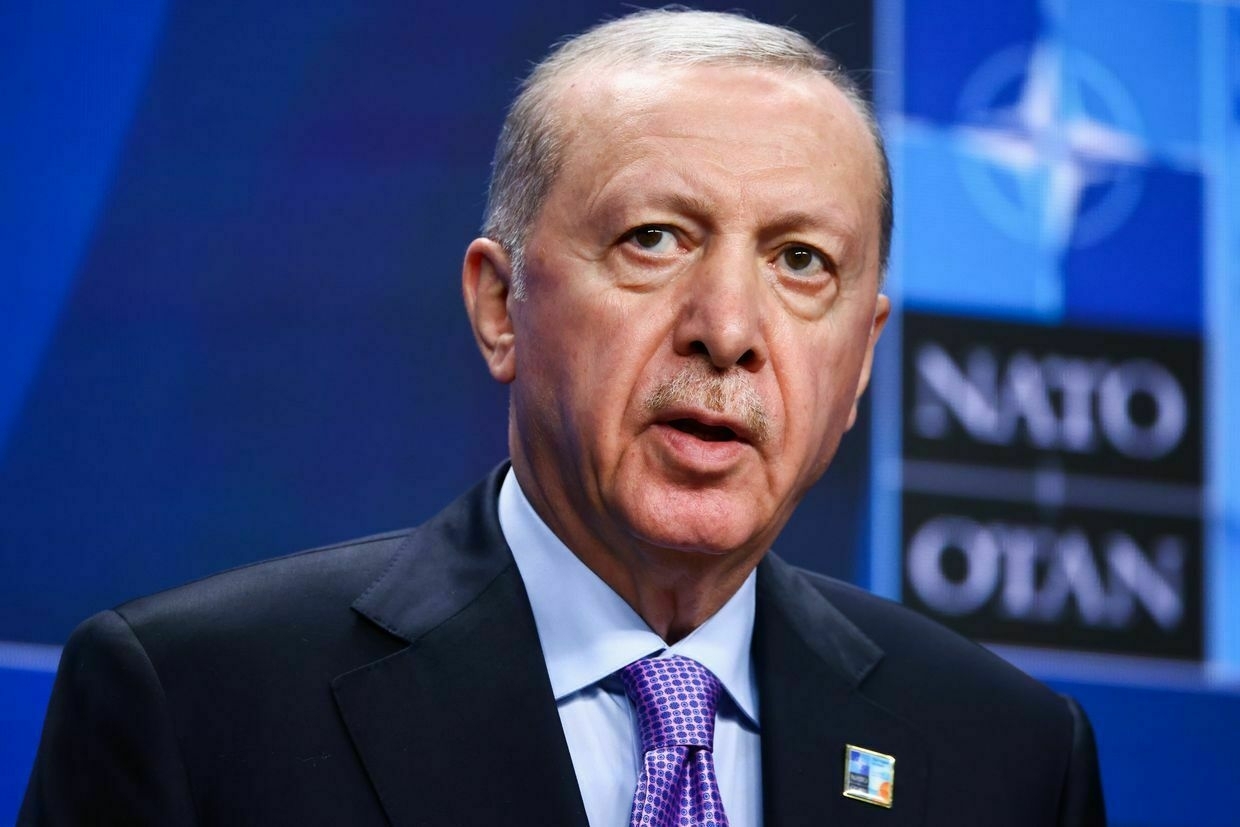
Turkish President Recep Tayyip Erdogan said Ankara is working to organize a meeting between President Volodymyr Zelensky and Russian President Vladimir Putin, with U.S. President Donald Trump potentially joining the talks, Reuters reported.
Speaking after his meeting with Trump, Erdogan said on June 26 that the U.S. president expressed interest in participating if the meeting were to take place in Turkey.
“He said,‘If Russian President Vladimir Putin comes to Istanbul or Ankara for a solution, then I will also come,'” Erdogan told reporters. “We will hold the necessary contacts and, God willing, realize this meeting as soon as possible."
Zelensky and Trump met during the NATO summit on June 25, where the two leaders discussed battlefield developments, Kyiv’s need for additional air defense systems, and the potential for co-production of drones.
Zelensky has previously voiced openness to a trilateral meeting. On May 27, he told public broadcaster Suspilne that he was ready to sit down with both Trump and Putin.
Putin has claimed he is also willing to meet, but did not attend previous talks proposed in Istanbul, opting instead to send lower-level delegates to peace discussions held on May 16.
The Kremlin has long sought to portray Zelensky as “illegitimate”, with spokesperson Dmitry Peskov in February claiming that any talks must consider “legal aspects” of his mandate.
Turkey previously hosted direct peace talks in March 2022 and has remained one of the few countries with open lines to both Kyiv and Moscow. The latest round of direct talks on June 2 was held in Istanbul.
Trump gets king’s treatment at NATO summit while Ukraine sits on the sidelinesTHE HAGUE, Netherlands — As NATO leaders convened in The Hague for a two-day summit on June 24–25, allies and Kyiv braced for the first annual meeting since U.S. President Donald Trump’s return to office. With the Israel-Iranian conflict dominating the news and the summit agenda focused onThe Kyiv IndependentMartin Fornusek
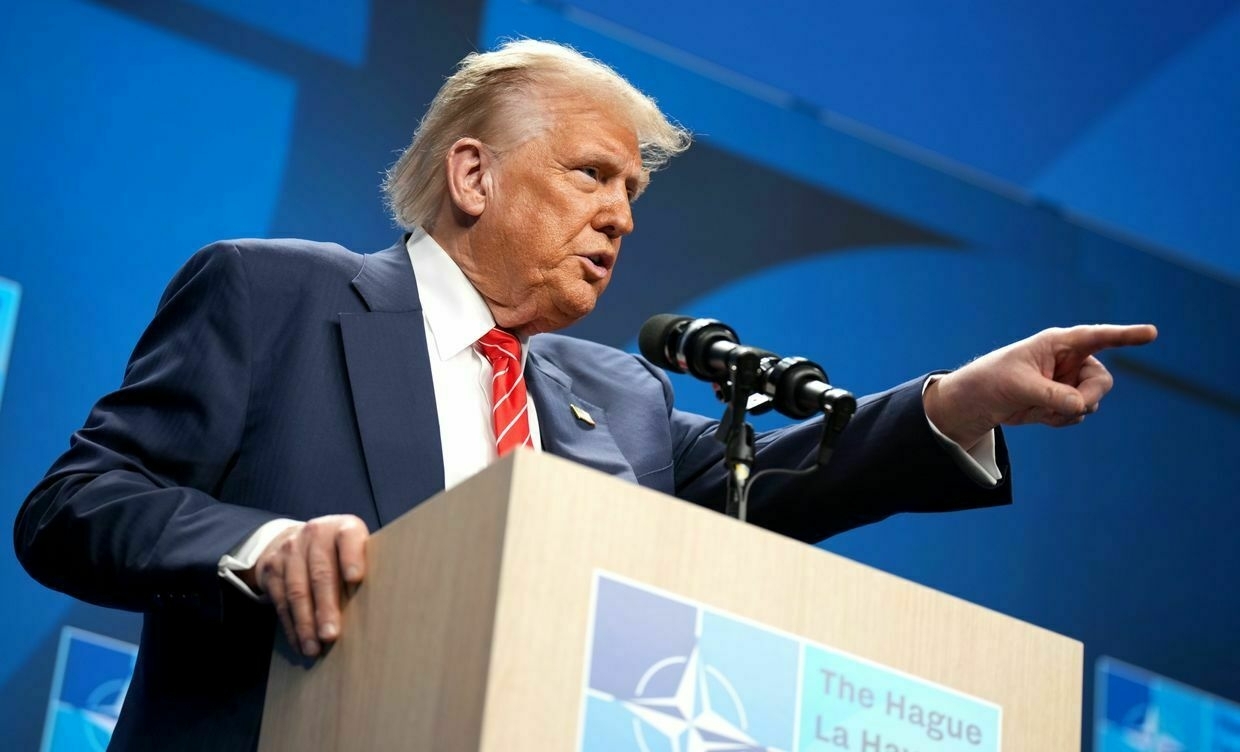
-
Trump gets king’s treatment at NATO summit while Ukraine sits on the sidelines
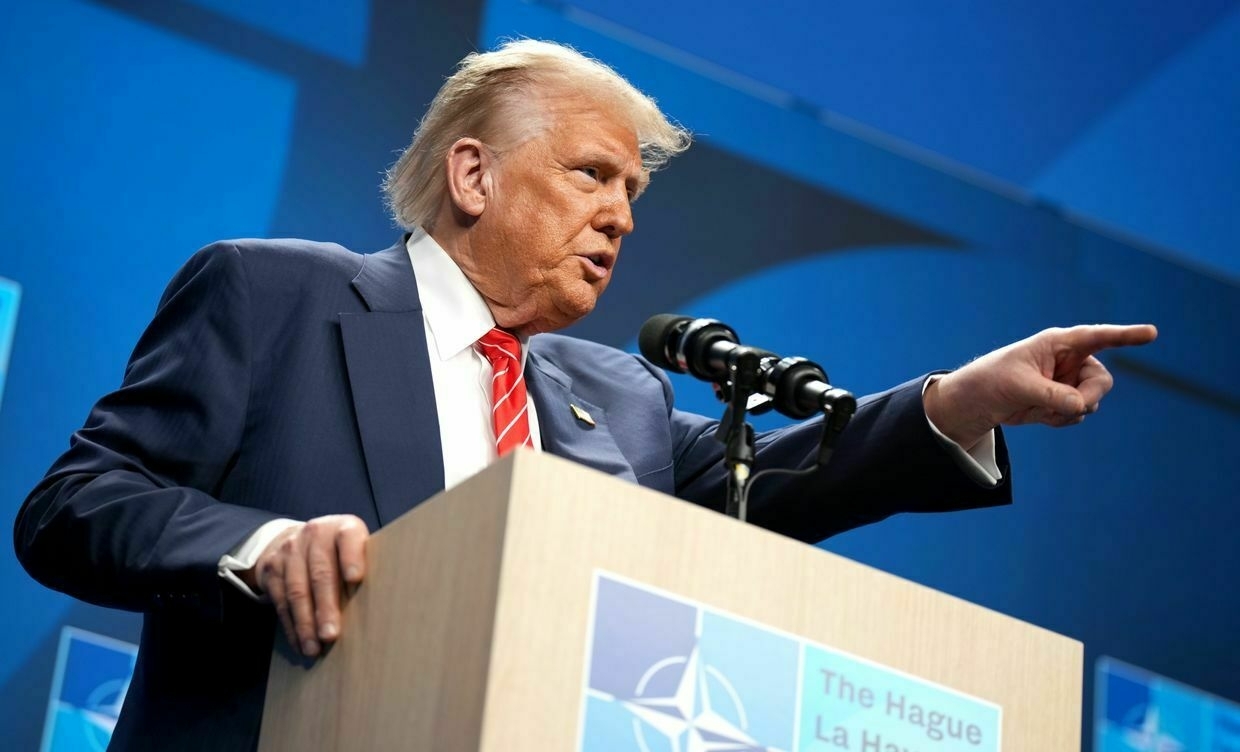
THE HAGUE, Netherlands — As NATO leaders convened in The Hague for a two-day summit on June 24–25, allies and Kyiv braced for the first annual meeting since U.S. President Donald Trump’s return to office.
With the Israel-Iranian conflict dominating the news and the summit agenda focused on the new 5% defense spending target, Ukraine no longer took center stage.
This was chiefly because of one man: Trump has shown little appetite for ramping up military assistance for Ukraine, and there are growing fears he might disengage from the war altogether.
He has also ruffled the feathers of his NATO allies by publicly doubting the U.S. commitment to Article 5.
NATO Secretary General Mark Rutte set out to demonstrate that transatlantic unity remains strong — even if that meant appeasing Trump with flattery and deprioritizing potentially divisive topics like Ukraine.
This shift was underscored by the summit’s final statement, which offered little more than stale words of comfort to the war-torn country, even as Russia launched new large-scale attacks against its cities.
President Volodymyr Zelensky did not leave the summit empty-handed, however. He got his much-desired meeting with Trump, which seemed to have gone smoothly.
Rutte also sought to reassure Kyiv that support for Ukraine holds, stressing that allies have committed some 35 billion euros ($40 billion) in aid to Ukraine this year so far, about 10 billion euros more than in the first half of last year.
But it hasn’t dispelled the sense that an era is ending — one in which Ukraine’s struggle against Russia held an unquestioned place at the center of NATO’s agenda.
Ukraine’s small victoriesThe NATO summit wasn’t a complete failure for Ukraine. In fact, the most pessimistic rumors swirling around in the lead-up to the event did not come true.
Zelensky did, after all, receive an invitation to the summit, dispelling speculation that Ukraine would be left out due to opposition from the U.S. He also managed to have a face-to-face meeting with Trump for the first time since their brief talk in the Vatican in April, rectifying the missed opportunity at the G7 summit.
“Everybody understands that the attack against Ukraine is an attack against us as well. Ukraine belongs to Europe.”
Though details of the meeting are scarce, Trump left the talk uncharacteristically critical of Russian leader Vladimir Putin.
Responding to a journalist during a press conference, the U.S. president acknowledged it is “possible” Putin may have territorial ambitions beyond Ukraine – a rare admission for Trump, who always professed his trust in the Russian leader.
"I consider him (Putin) a person I think is misguided," Trump said.
"I think it’s a great time to end it (war). I’m going to speak to Vladimir Putin, see if we can get it ended," Trump added. "He (Zelensky) is fighting a brave battle, it's a tough battle."
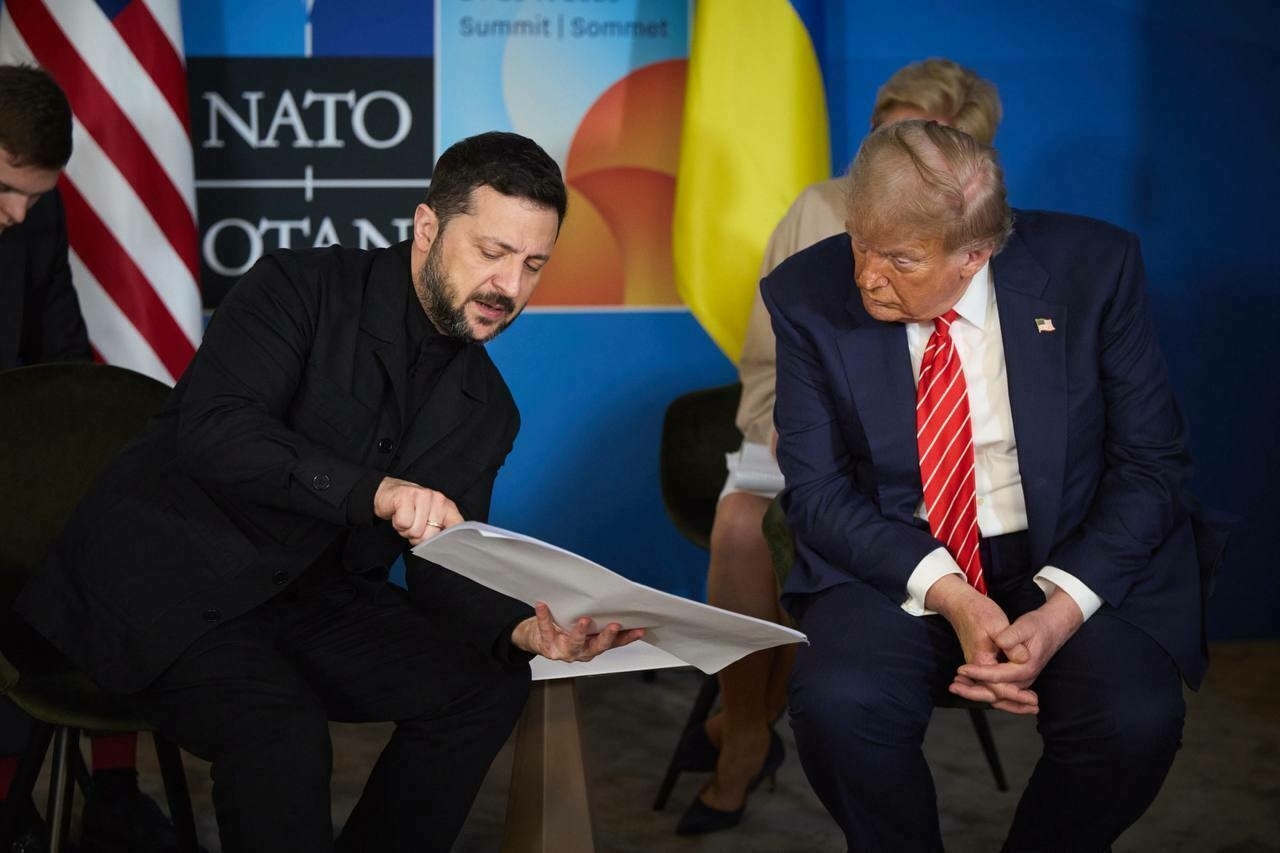
President Volodymyr Zelensky (L) and U.S. President Donald Trump (R) meet during the NATO Summit in The Hague, Netherlands, on June 25, 2025. (Zelenskiy / Official Telegram Account / Handout / Anadolu via Getty Images) Trump also carefully signaled support for sending Ukraine additional missiles for Patriot air defense systems, though no concrete commitment was made. Asked about further air defense assistance by a Ukrainian journalist whose husband is a soldier fighting in Ukraine, Trump, in a rare show of sympathy toward Ukrainians, acknowledged her distress over Russia’s escalating aerial attacks.
"They (Ukraine) do want to have the anti-missile missiles, as they call them, the Patriots, and we're going to see if we can make some available," Trump said.
Other NATO leaders reaffirmed their steadfast support for Ukraine as it continues to resist Russia’s full-scale invasion, now in its fourth year.
“Everybody understands that the attack against Ukraine is an attack against us as well. Ukraine belongs to Europe,” Estonian Foreign Minister Margus Tsakhna told the Kyiv Independent during an interview at the summit.
Zelensky’s rhetoric was focused on pressuring Russia to accept a just peace and on raising more international funding for the Ukrainian defense industry.
Individual countries and other partners responded. The Netherlands and Norway pledged hundreds of millions to the Ukrainian defense industry, while the EU confirmed that its new, ambitious $175-billion SAFE defense spending program will be open to Kyiv.
But as the summit unfolded, it became increasingly clear that the spotlight is on Trump.
Putin insists the Russian economy is fine, but Kremlin officials say otherwiseIn a rare public sign that all is not well in Russia, two high-ranking Moscow officials last week issued separate warnings about the state of the country’s economy. Russian Central Bank Governor Elvira Nabiullina and Economy Minister Maxim Reshetnikov both highlighted that amid the Kremlin’s full-scale war against Ukraine, the tools Moscow once relied on to maintain wartime growth are nearly exhausted. Almost immediately, Russian President Vladimir Putin on June 20 dismissed the concerns, clai The Kyiv IndependentTim Zadorozhnyy
The Kyiv IndependentTim Zadorozhnyy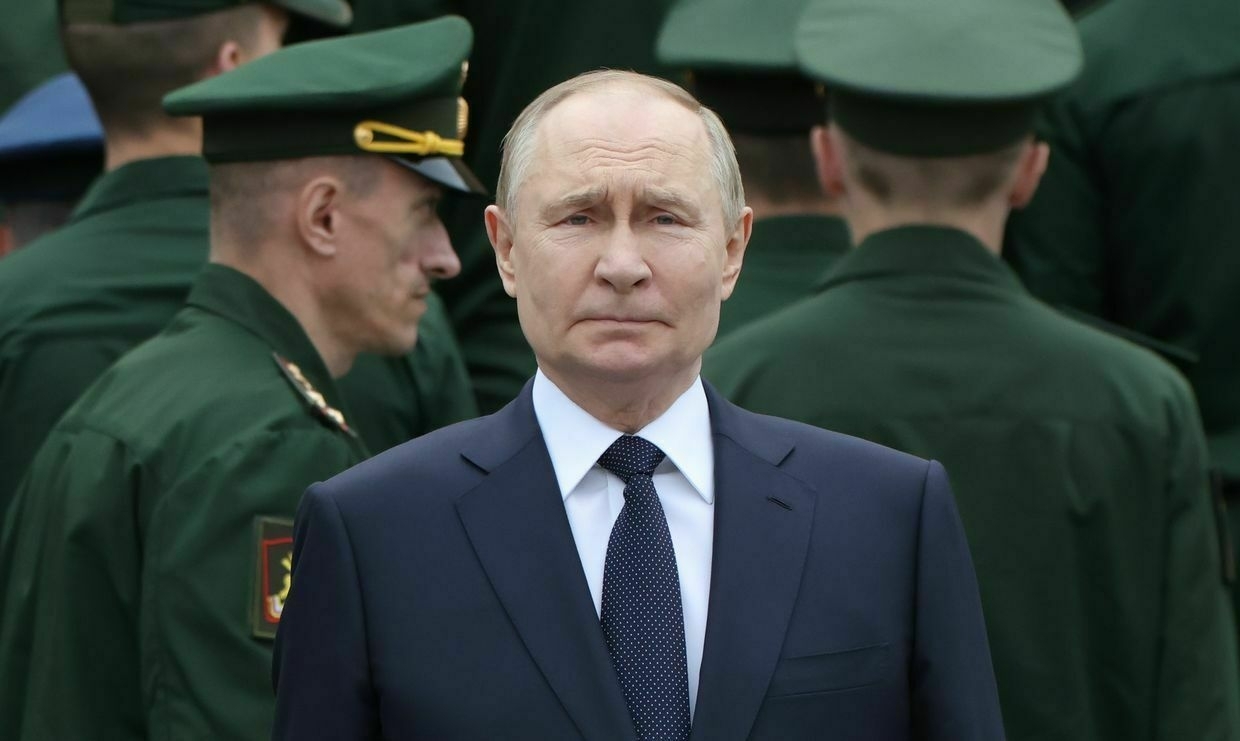
Charm offensive, aimed at TrumpTo say that The Hague summit took place at a precarious moment would be an understatement.
NATO is gripped by what is arguably its greatest existential crisis yet, and the most challenging security situation since the Cold War.tes
Since taking office, Trump has signaled plans to reduce military presence in Europe and cast doubt on his commitment to Article 5 – including just before his trip to the summit.
As Trump’s attention wanders away from Europe and Ukraine to the Israel-Iran conflict and other regions, Europeans are left to grapple with the fears that they might have to face Russian aggression on their own.
“Mr President, dear Donald, Congratulations and thank you for your decisive action in Iran, that was truly extraordinary, and something no one else dared to do. It makes us all safer.”
Perhaps that is why NATO leaders were so dead set on bringing Trump to the summit.
As the Kyiv Independent learned from a Ukrainian official, member countries pulled out all the stops to get Trump to attend, giving him a king’s treatment during the dinner and keeping the summit deliberately short.
Leading this charm offensive was the secretary general himself.
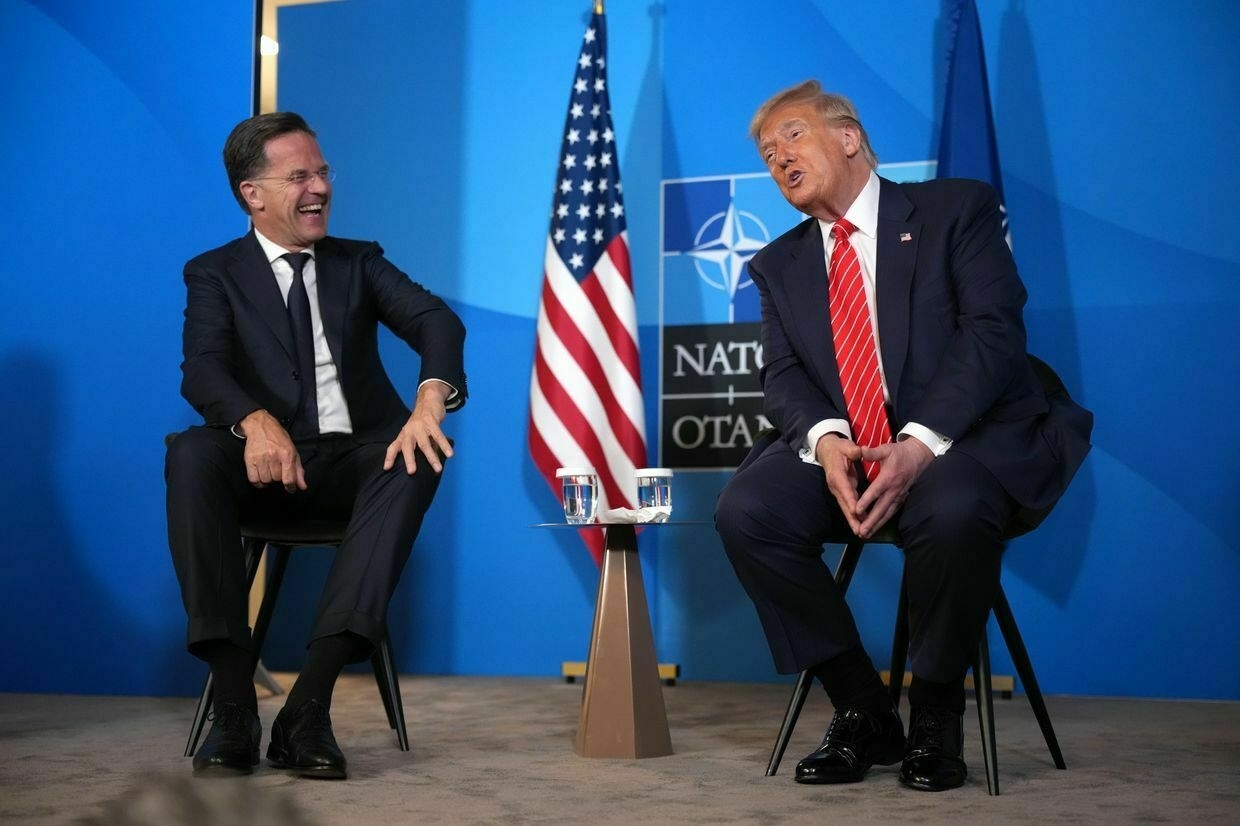
U.S. President Donald Trump (R) and NATO Secretary General Mark Rutte (L) speak to media at the start of the second day of the 2025 NATO Summit in The Hague, Netherlands, on June 25, 2025. (Andrew Harnik / Getty Images) 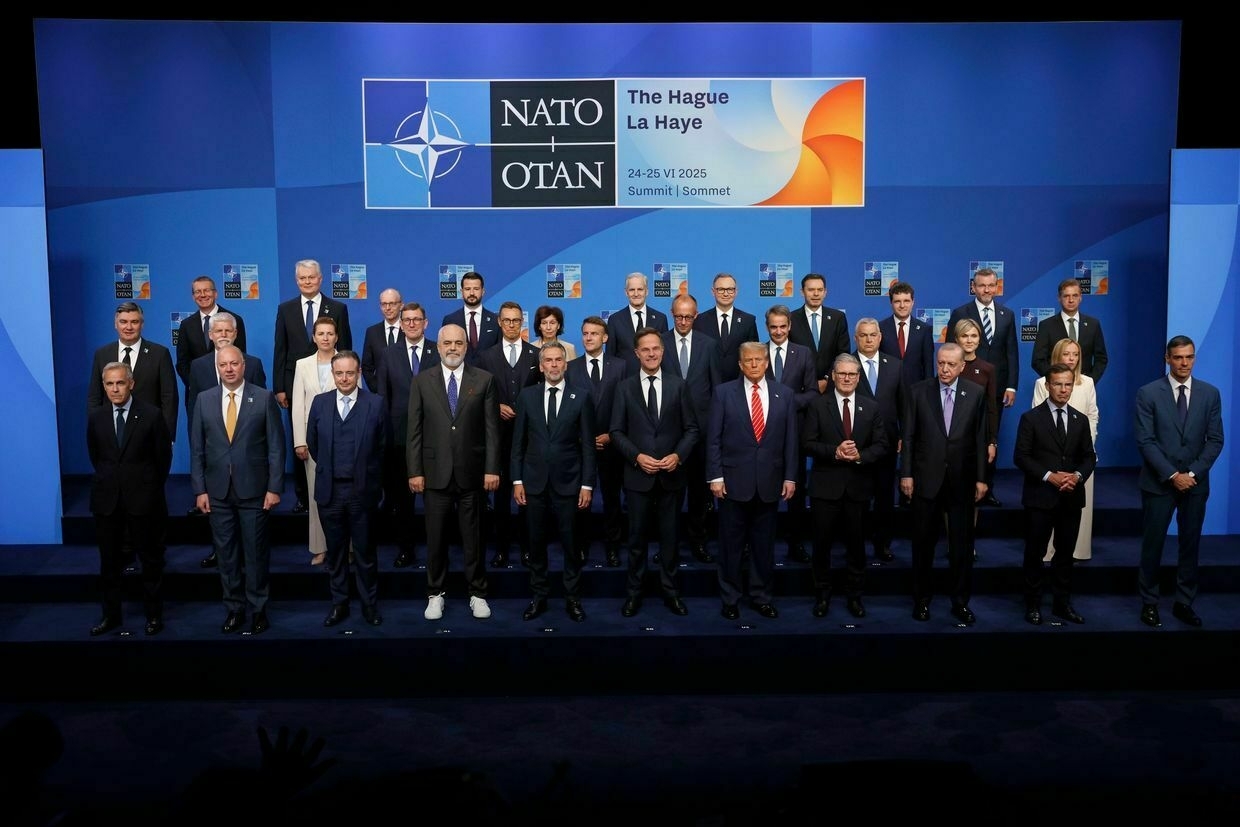
NATO heads of state and government pose for an official photo on the second day of the 2025 NATO Summit in The Hague, Netherlands, on June 25, 2025. (Omar Havana / Getty Images) “Mr President, dear Donald, Congratulations and thank you for your decisive action in Iran, that was truly extraordinary, and something no one else dared to do. It makes us all safer,” Rutte wrote in a message to Trump ahead of the summit, which the U.S. president promptly published.
“Europe is going to pay in a BIG way, as they should, and it will be your win,” he continued, referring to an agreement to raise the defense spending benchmark to 5% of GDP in a style strikingly similar to Trump’s.
Asked by a journalist whether the revelation of this text was not embarrassing for him, Rutte only doubled down, jokingly referring to Trump as a “daddy” during a briefing.
The summit’s focus on defense spending was likely a deliberate offering to Trump, who has lambasted European allies as underpaying freeloaders. When Rutte managed to get a unanimous agreement on the new spending target despite protests from Spain, he had a big win to present to Trump.
"Your leadership on this has already produced $1 trillion in extra spending from European allies since 2016. And decisions today will produce trillions more for common defense,” Rutte told Trump during the summit.
Trump has not been alone in this criticism. NATO’s eastern members, who devote considerably more to defense than their western and southern partners, echoed the sentiment.
“I totally agree with President Trump… Europe must pay more, Europe must take more responsibility for its own defense,” Tsakhna said.
“Europe has been like an old, lazy cat who was just waiting for something bad to happen, and the U.S. would come and solve the problems.”
Rutte's strategy seemed to have paid off. Trump appeared in good spirits, praising the new defense pledge while enjoying a flurry of questions from journalists that, in the absolute majority, focused on recent U.S. strikes on Iran.
Trump also signed off on the final statement that reaffirmed commitment to Article 5, mollifying his earlier comments.
Ukraine sidelinedWhile the final communique of the NATO summit in Washington last year was 38 paragraphs long, with six devoted to support for Ukraine, this year’s joint declaration was a mere five paragraphs.
The document did name Russia as a threat to the Euro-Atlantic security and reaffirmed support for Kyiv, but stopped short of condemning Moscow, mentioning Ukraine’s NATO aspirations, or offering any concrete new assistance.
This did not come as a surprise. Already in the runup to the summit, Bloomberg reported that the joint communique would omit these topics to avert friction with the U.S. president, who has been averse to offending Russia.
Rutte used the summit to repeat the familiar pledge that Ukraine’s path toward NATO is “irreversible,” but it was obvious that Kyiv’s accession, openly opposed by Trump, would not see any development in the near future.
Even as Russia launched a brutal aerial attack against Dnipro during the summit, which killed 19 people and injured 300, NATO offered Ukraine little but words.
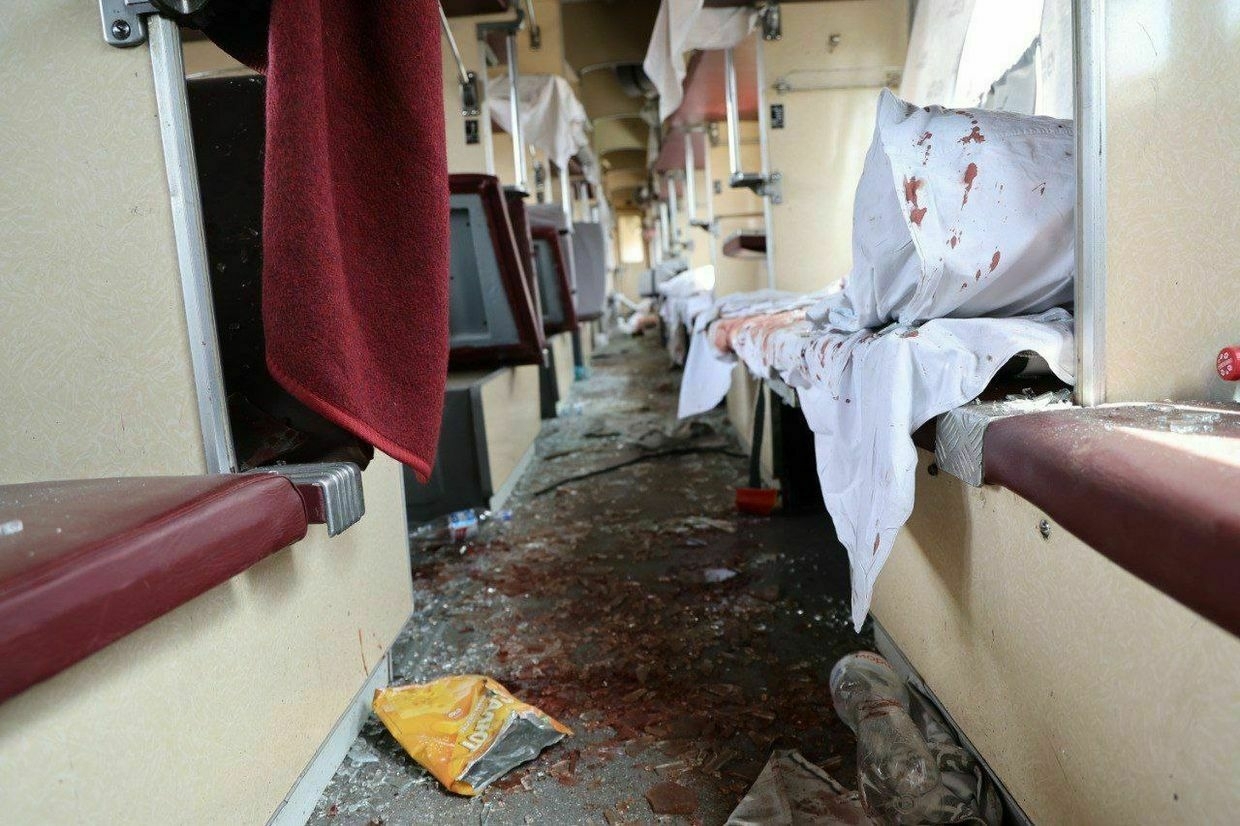
The aftermath of a Russian ballistic missile attack damaged a passenger train in Dnipro, Ukraine, on June 24, 2025. (Serhii Lysak / Telegram) What Ukraine received at this year’s NATO summit was a far cry from the bold pledges made last year in Washington.
But the meeting passed without any visible friction between Trump and his Ukrainian and European partners, with Ukraine even grabbing a few modest wins.
In the era of Trump, that might be a success of itself.
Asami Terajima contributed to reporting.Note from the author:
Hi, this is Martin Fornusek. I hope you enjoyed this article. If you want to help us continue covering crucial events like the NATO summit in The Hague, please consider becoming our member.
Thank you very much.
-
Taking lessons from Ukraine war, Trump's US defense budget prioritizes drones, missiles
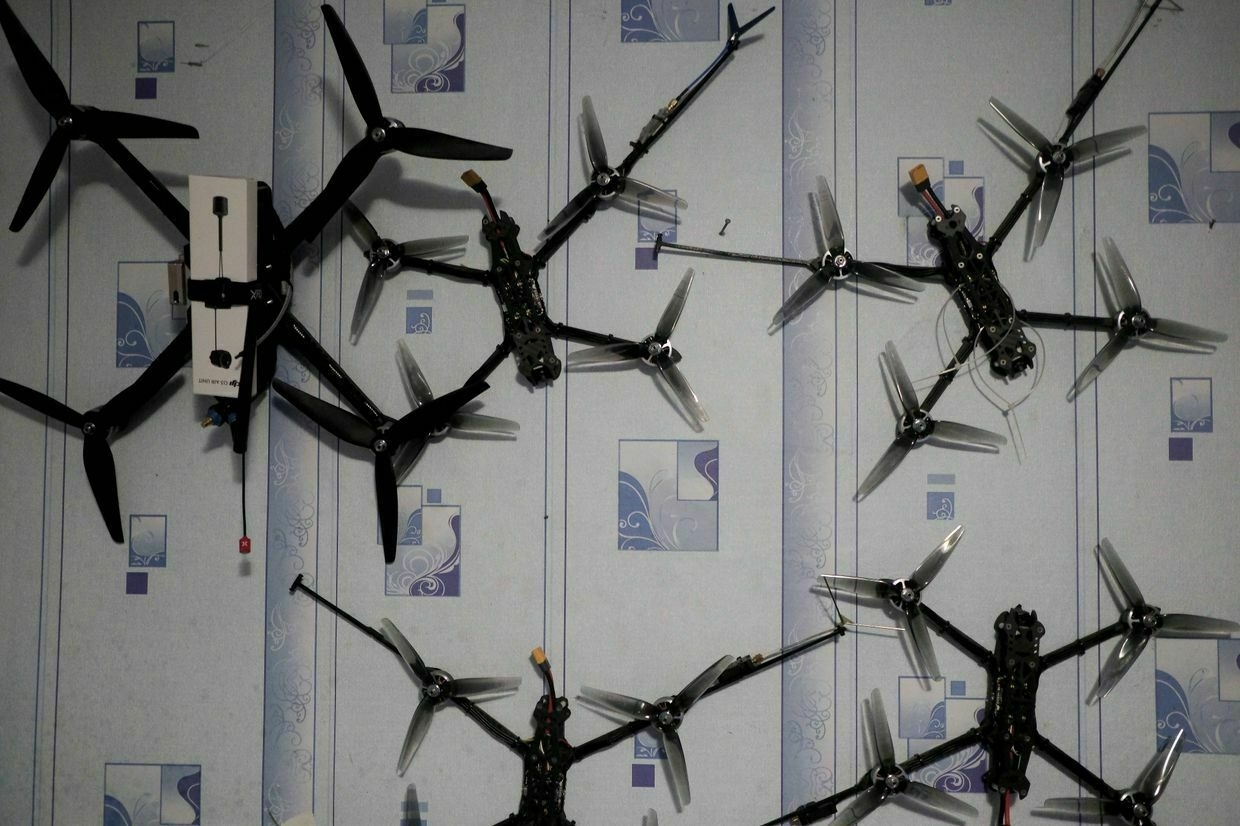
U.S. President Donald Trump’s proposed defense budget for fiscal year 2026 prioritizes drones and long-range missile systems over traditional air and naval platforms, Reuters reported on June 26.
The $892.6 billion request maintains the overall funding level from 2025 but shifts spending toward innovation and high-tech systems. The budget includes increased investment in small drones, a response to their proven battlefield value in Ukraine.
The proposal slashes procurement of key legacy systems. Trump’s plan includes just 47 F-35 fighter jets, down from the 68 planned by the Biden administration, and only three warships.
The Pentagon will continue to purchase Joint Air to Surface Standoff Missile – Extended Range and Long Range Anti-Ship missiles for the U.S. Air Force. Fewer Precision Strike Missiles, meant to replace the ATACMS, are included in the main request.
The proposal also includes a 3.8% increase in military salaries, while decommissioning aging and costly aircraft and ships. The Navy’s civilian workforce will be reduced by more than 7,000 employees to free up resources for technology and modernization.
The shift from traditional fleet expansion indicates a move towards asymmetric, precise warfare with drones playing a crucial battlefield role.
Ukraine’s experience has informed several elements of the request. Since Russia’s full-scale invasion in 2022, Kyiv has expanded drone production across all domains — air, land, and sea — with plans to manufacture 30,000 long-range drones in 2025.
Ukraine’s hybrid strike platforms, such as the Palianytsia and Peklo missile-drones, have drawn international attention for their range and versatility.
Putin insists the Russian economy is fine, but Kremlin officials say otherwiseIn a rare public sign that all is not well in Russia, two high-ranking Moscow officials last week issued separate warnings about the state of the country’s economy. Russian Central Bank Governor Elvira Nabiullina and Economy Minister Maxim Reshetnikov both highlighted that amid the Kremlin’s full-scale war against Ukraine, the tools Moscow once relied on to maintain wartime growth are nearly exhausted. Almost immediately, Russian President Vladimir Putin on June 20 dismissed the concerns, clai The Kyiv IndependentTim Zadorozhnyy
The Kyiv IndependentTim Zadorozhnyy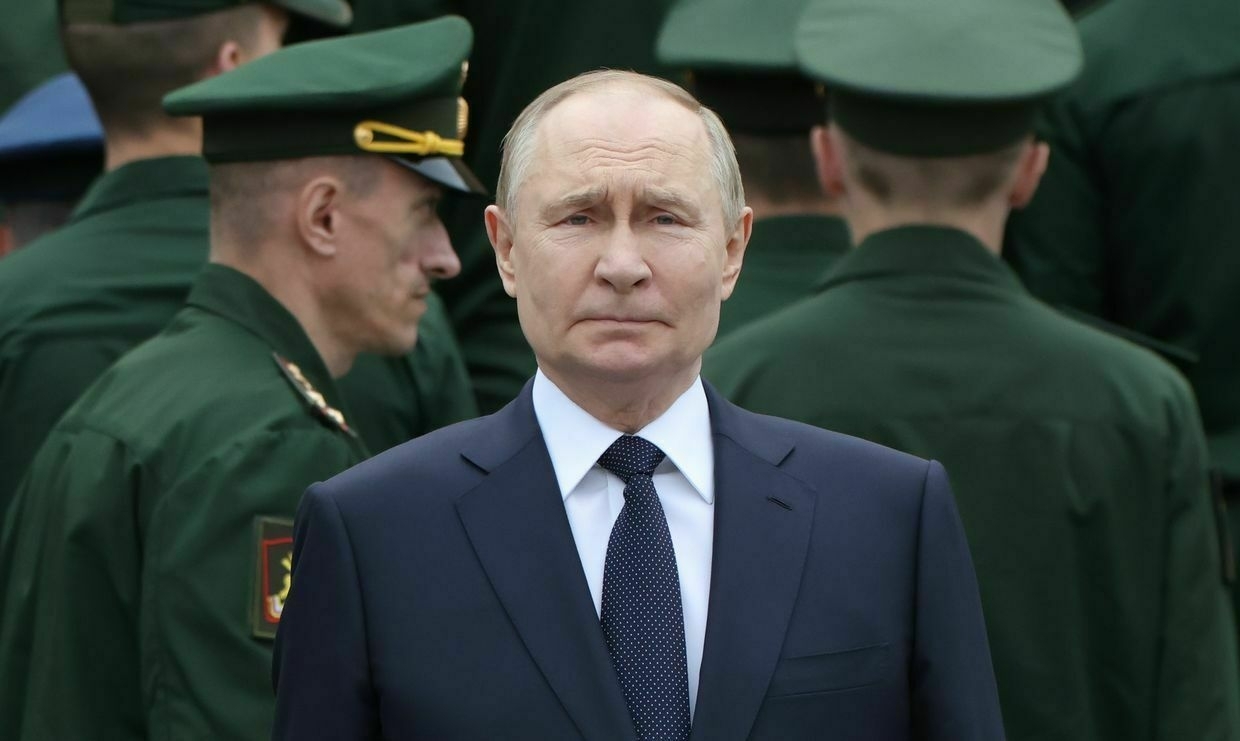
-
Ukraine to receive 20 new Rheinmetall Ermine vehicles — here's what they can do

The Dutch Defense Ministry will finance the production of 20 Ermine ground vehicles for Ukraine, German defense manufacturer Rheinmetall announced on June 25.
The contract, signed during the NATO summit in The Hague, marks the first order for the new-generation tactical platform. Ukraine will become the first country in the world to receive the Ermine.
The Ermine, developed by Rheinmetall Defence Nederland, is designed primarily for front-line evacuation missions.
The light buggies provide fast, maneuverable transport for wounded personnel in combat zones. Rheinmetall said the deliveries are expected to begin in 2026.
According to Rheinmetall, the Ermine is a “lightweight tactical system that combines the robustness of a diesel unit with many advantages of an electric drive."
It’s a modular system that comes in four configurations — 4x4 quad, 4x4/6x6 buggy, or Unmanned Ground Vehicle (UGV).
The Ermine combines a diesel engine with an electric motor that allows for what Rheinmetall describes as “Silent Move & Silent Watch,” and has a range of up 1,200 kilometers, and can carry up to a tonne.
“The electrical powertrain makes the Ermine almost silent. It is capable of driving up to 50 km silently through heavy terrain and up to 100 km on the road,” the company said.
“The system offers its users significant tactical advantages in avoiding enemy reconnaissance."
The electrical engine can even provide charging points for soldiers out in the field.

An Ermine ground vehicle developed by Rheinmetall Defence Nederland mainly for front-line evacuation missions (Rheinmetall) On June 24, Dutch Prime Minister Dick Schoof presented a new military aid package for Ukraine, including 100 drone radar systems, front-line vehicles, and 80 million euros (over $90 million) for the drone initiative.
The NATO summit concluded on June 25 with a joint pledge by member states to raise defense spending to 5% of GDP by 2035. The updated target reflects shifting priorities within the Alliance as the war in Ukraine drags into its fourth year.
Unlike in previous years, the 2025 summit communique did not include an explicit condemnation of Russia’s invasion. Still, the final statement reaffirmed support for Ukraine and said assistance to its defense industry will count toward the new spending benchmark.
President Volodymyr Zelensky met with U.S. President Donald Trump during the summit, where the two leaders discussed battlefield developments, Kyiv’s need for additional air defense systems, and the potential for co-production of drones.
“They (Ukraine) do want to have the anti-missiles, as they call them, the Patriots, and we’re going to see if we can make some available,” Trump said. “They are very hard to get. We need them too. We are supplying them for Israel, and they are very effective."
Trump’s remarks signal a potential boost to Ukraine’s air defense capabilities, which have come under increasing strain amid intensifying Russian attacks.
Meloni tells Trump US must show ‘same determination’ on Ukraine as with Iran“I said the same determination is needed to achieve two other important ceasefires,” Meloni said.The Kyiv IndependentTim Zadorozhnyy
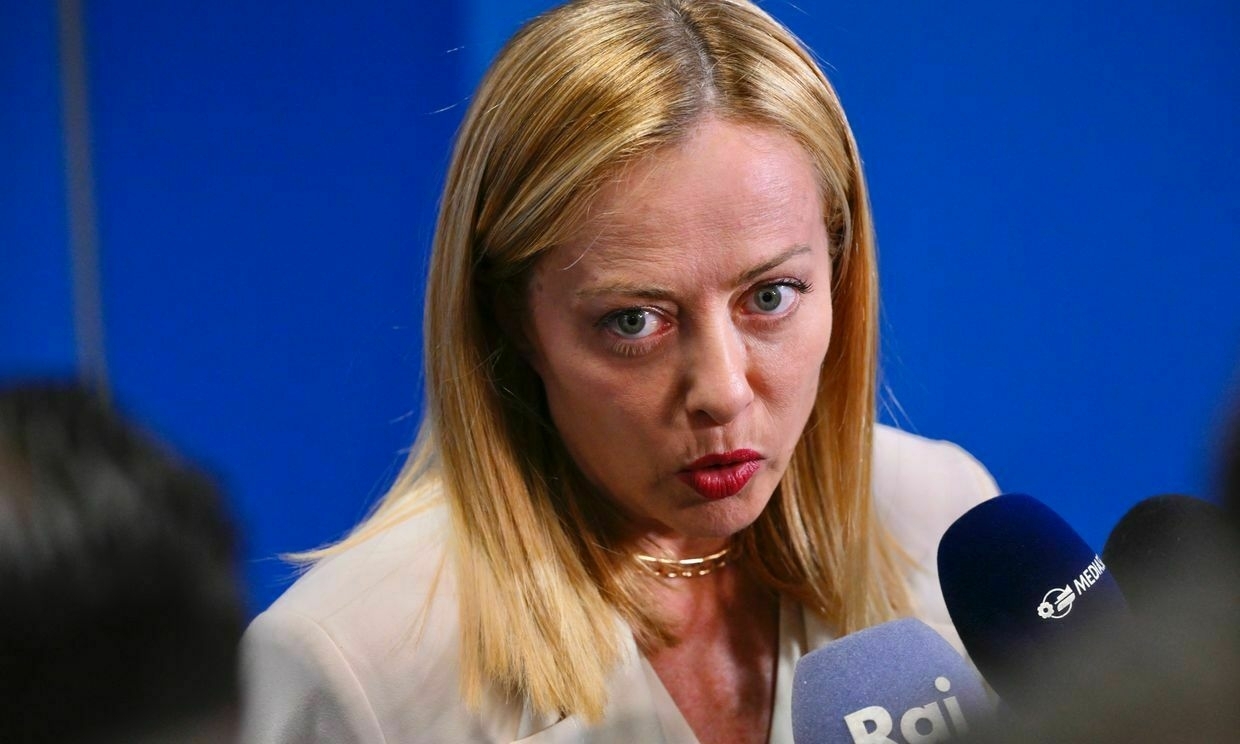
-
Meloni tells Trump US must show 'same determination' on Ukraine as with Iran
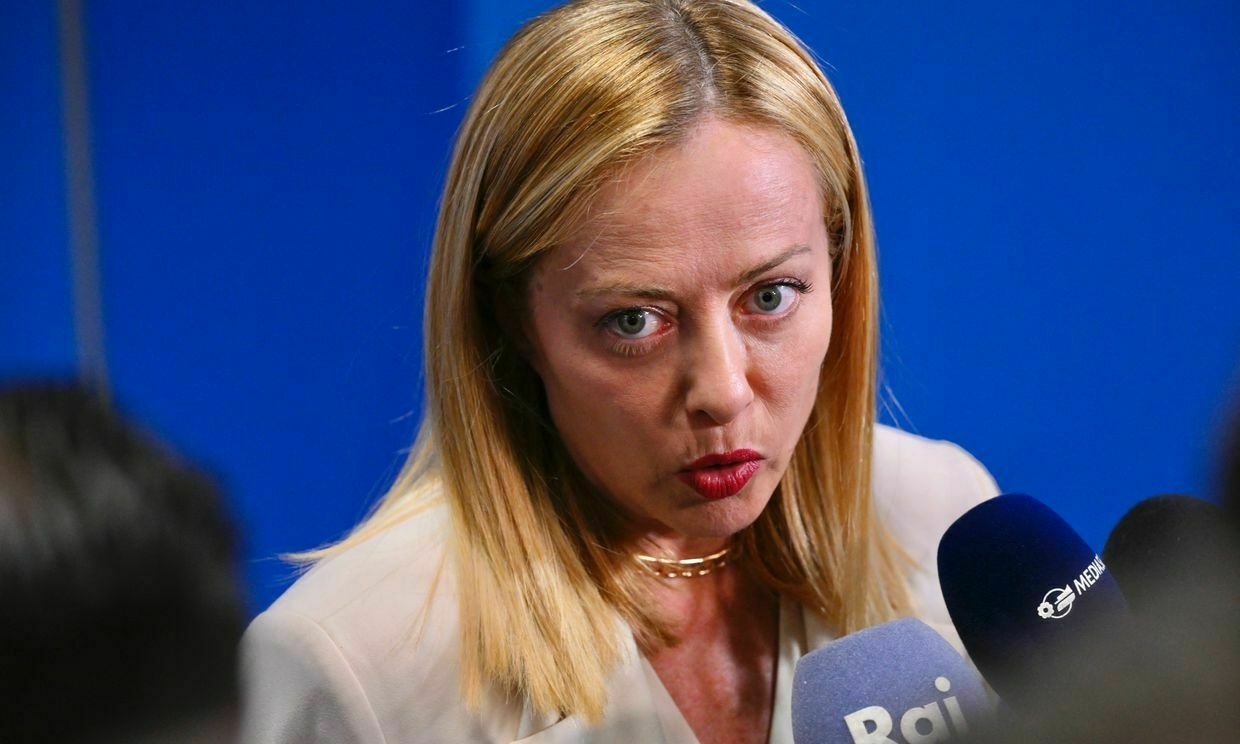
Italian Prime Minister Giorgia Meloni told U.S. President Donald Trump that the determination shown by the U.S. toward Iran should also be applied to ending Russia’s war against Ukraine, she said on June 25 on the sidelines of the NATO summit in The Hague.
Meloni, a close Trump ally and the only European leader invited to his 2025 inauguration, welcomed the recently announced ceasefire between Israel and Iran.
She emphasized that sustained commitment is also needed in Ukraine, where Russian President Vladimir Putin last week declared “all of Ukraine is ours."
“I spoke about this with President of the United States Donald Trump, to whom I said the same determination is needed to achieve two other important ceasefires,” Meloni said. “One in Ukraine, where Russia seems unwilling to take any steps forward, and one in Gaza."
On June 24, Trump announced that a ceasefire between Iran and Israel had taken effect following U.S. airstrikes on Iran’s nuclear infrastructure.
The escalation followed Israel’s June 13 attack that prompted Iran to retaliate with missile attacks on Tel Aviv and other cities, killing multiple civilians, including five Ukrainian citizens.
President Volodymyr Zelensky met with Trump during the summit, held amid concerns over waning U.S. support for Kyiv. Unlike in 2024, this year’s communique did not directly condemn Russia’s invasion, a shift that underscores changing political dynamics within the Alliance.
The leaders reaffirmed support for Ukraine’s defense, saying national contributions toward Ukraine’s military-industrial capacity will count toward NATO’s new defense spending goal.
All 32 NATO member states agreed to a new benchmark, committing to raise defense spending to 5% of GDP by 2035. Meloni praised the decision as a sign of unity.
“I believe the unity of the alliance and its willingness to strengthen itself is more important, especially in the context we are in, and is clearly a very important element,” she said.
The NATO summit comes just one week after Trump departed early from the G7 in Canada, delaying direct talks with Zelensky until June 25.
Ukraine war latest: US signals more Patriot missiles for Kyiv after Zelensky-Trump talks at NATO summitKey developments on June 25: * Zelensky, Trump hold talks on NATO summit sidelines * ‘Something unknown’ hits key Russian drone facility in Taganrog, Ukrainian official says * Russia has launched over 28,000 Shahed drones at Ukraine since 2022, with nearly 10% fired in June alone, Zelensky says * Donetsk Oblast city “onThe Kyiv IndependentThe Kyiv Independent news desk
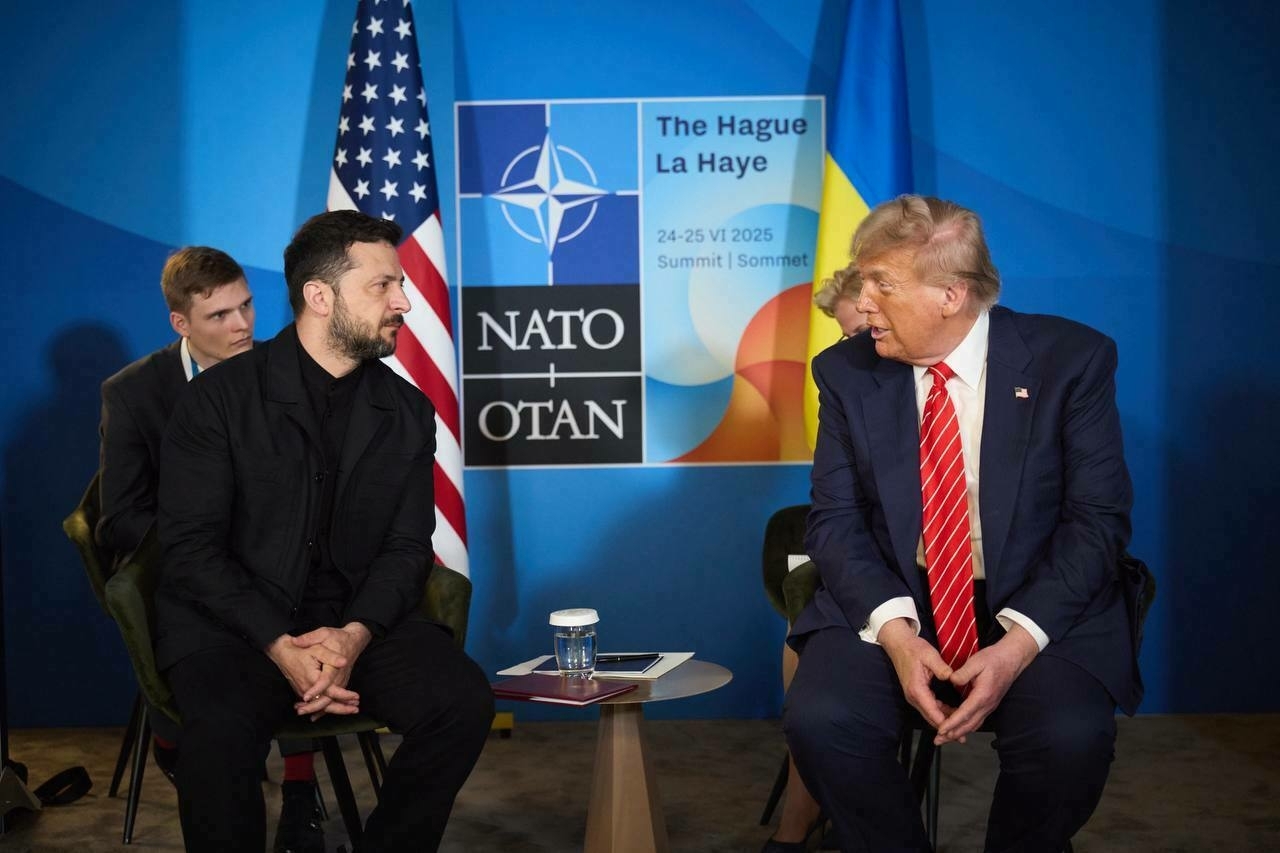
-
General Staff: Russia has lost 1,015,750 troops in Ukraine since Feb. 24, 2022
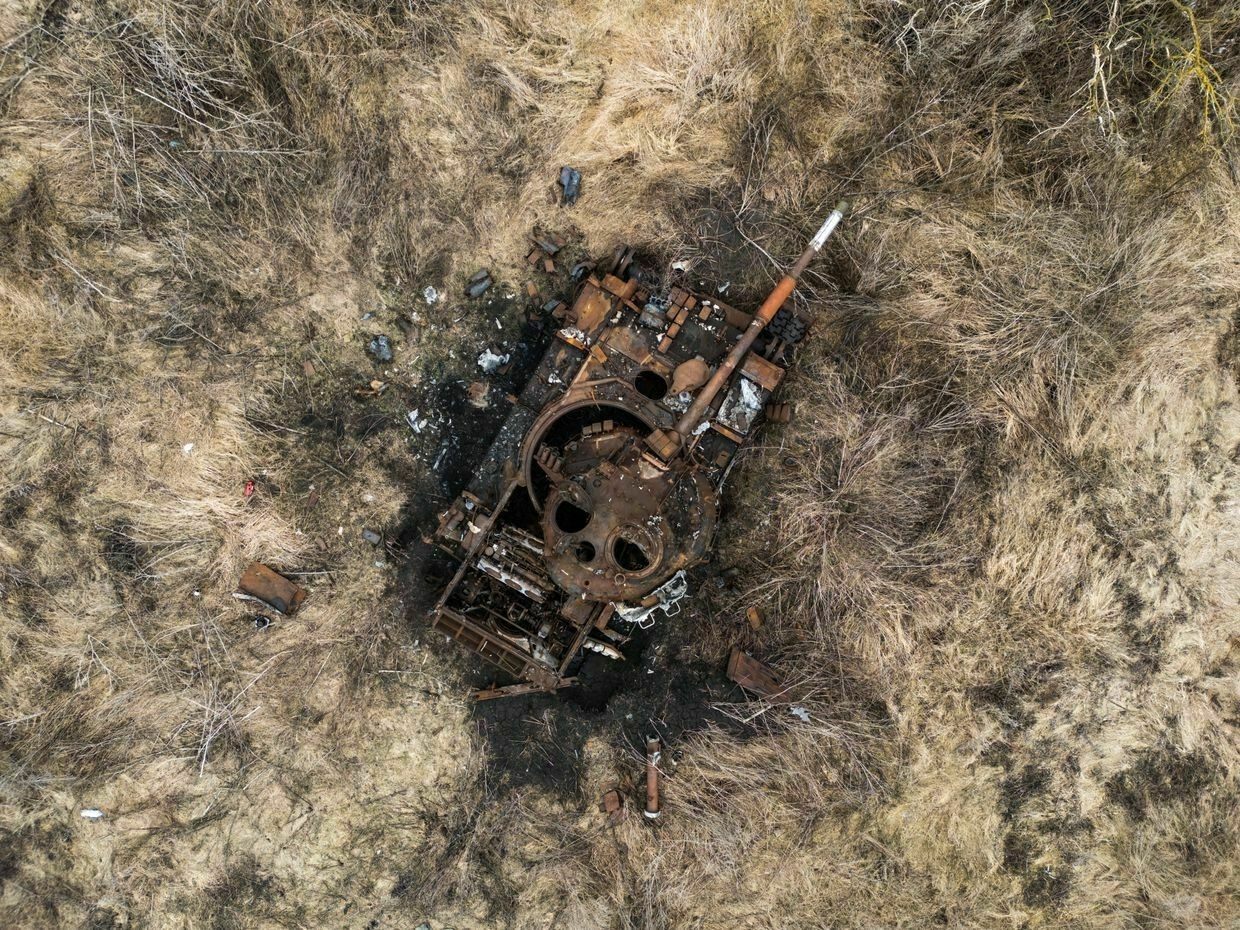
Russia has lost 1,015,750 troops in Ukraine since the beginning of its full-scale invasion on Feb. 24, 2022, the General Staff of Ukraine’s Armed Forces reported on June 26.
The number includes 1,100 casualties that Russian forces suffered just over the past day.
According to the report, Russia has also lost 10,968 tanks, 22,892 armored fighting vehicles, 53,195 vehicles and fuel tanks, 29,617 artillery systems, 1,425 multiple launch rocket systems, 1,188 air defense systems, 416 airplanes, 337 helicopters, 42,153 drones, 3,388 cruise missiles, 28 ships and boats, and one submarine.
Ukraine war latest: US signals more Patriot missiles for Kyiv after Zelensky-Trump talks at NATO summitKey developments on June 25: * Zelensky, Trump hold talks on NATO summit sidelines * ‘Something unknown’ hits key Russian drone facility in Taganrog, Ukrainian official says * Russia has launched over 28,000 Shahed drones at Ukraine since 2022, with nearly 10% fired in June alone, Zelensky says * Donetsk Oblast city “onThe Kyiv IndependentThe Kyiv Independent news desk
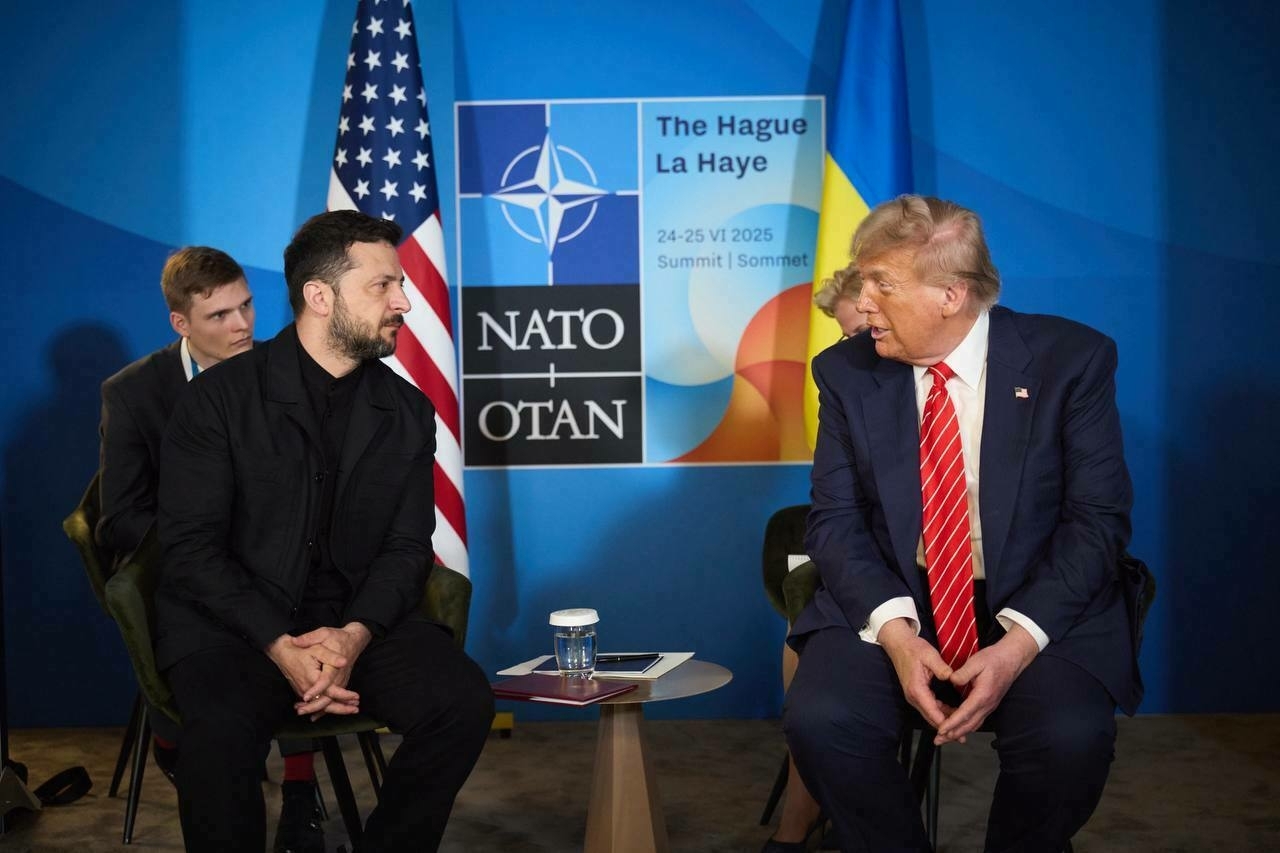
-
Explosions reported in Moscow, airport restrictions imposed as Russian authorities claim drone attack
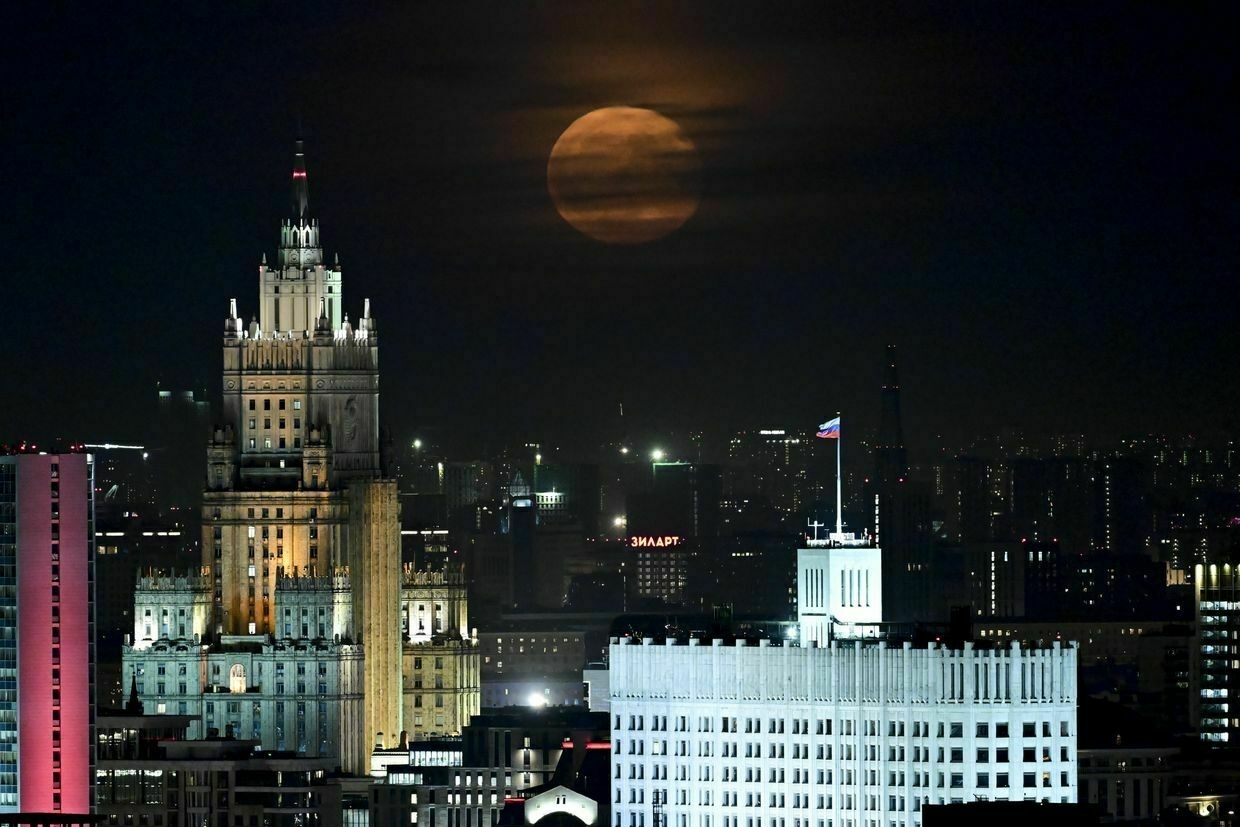
Editor’s note: This is a developing story and is being updated.
Explosions were reported in Moscow overnight on June 26, with Mayor Sergey Sobyanin claiming two drones were shot down by air defenses.
Two drones were shot down, Sobyanin said, adding that emergency services are responding at the wreckage sites.
Ukraine’s military regularly strikes military targets deep within Russia in an attempt to diminish Moscow’s fighting power as it continues its war against Ukraine.
Explosions were reportedly heard in the city, independent media reported, citing Moscow’s residents.
The Kyiv Independent could not independently verify these claims.
Kaluga airport and Moscow’s Vnukovo airport had flight restrictions imposed amid the drone attack, Artyom Korenyako, a spokesperson for Russia’s state aviation agency Rosaviatsia, said early on June 26.
“The airport is temporarily not accepting or sending flights. Aircraft crews, air traffic controllers, and airport services must take all necessary measures to ensure flight safety,” he said.
The restrictions were later lifted.
On June 1, Ukraine launched a game-changing drone attack on four key Russian military airfields, damaging 41 planes, including heavy bombers and rare A-50 spy planes.
Kyiv claimed it disabled 34% of Russia’s strategic bomber fleet in what is seen as one of the most daring operations during Russia’s full-scale war.
Ukraine’s military intelligence agency was behind explosions near Desantnaya Bay in Russia’s far eastern Vladivostok on May 30, which reportedly damaged military personnel and equipment, a source in HUR told the Kyiv Independent.
Ukraine war latest: US signals more Patriot missiles for Kyiv after Zelensky-Trump talks at NATO summitKey developments on June 25: * Zelensky, Trump hold talks on NATO summit sidelines * ‘Something unknown’ hits key Russian drone facility in Taganrog, Ukrainian official says * Russia has launched over 28,000 Shahed drones at Ukraine since 2022, with nearly 10% fired in June alone, Zelensky says * Donetsk Oblast city “onThe Kyiv IndependentThe Kyiv Independent news desk
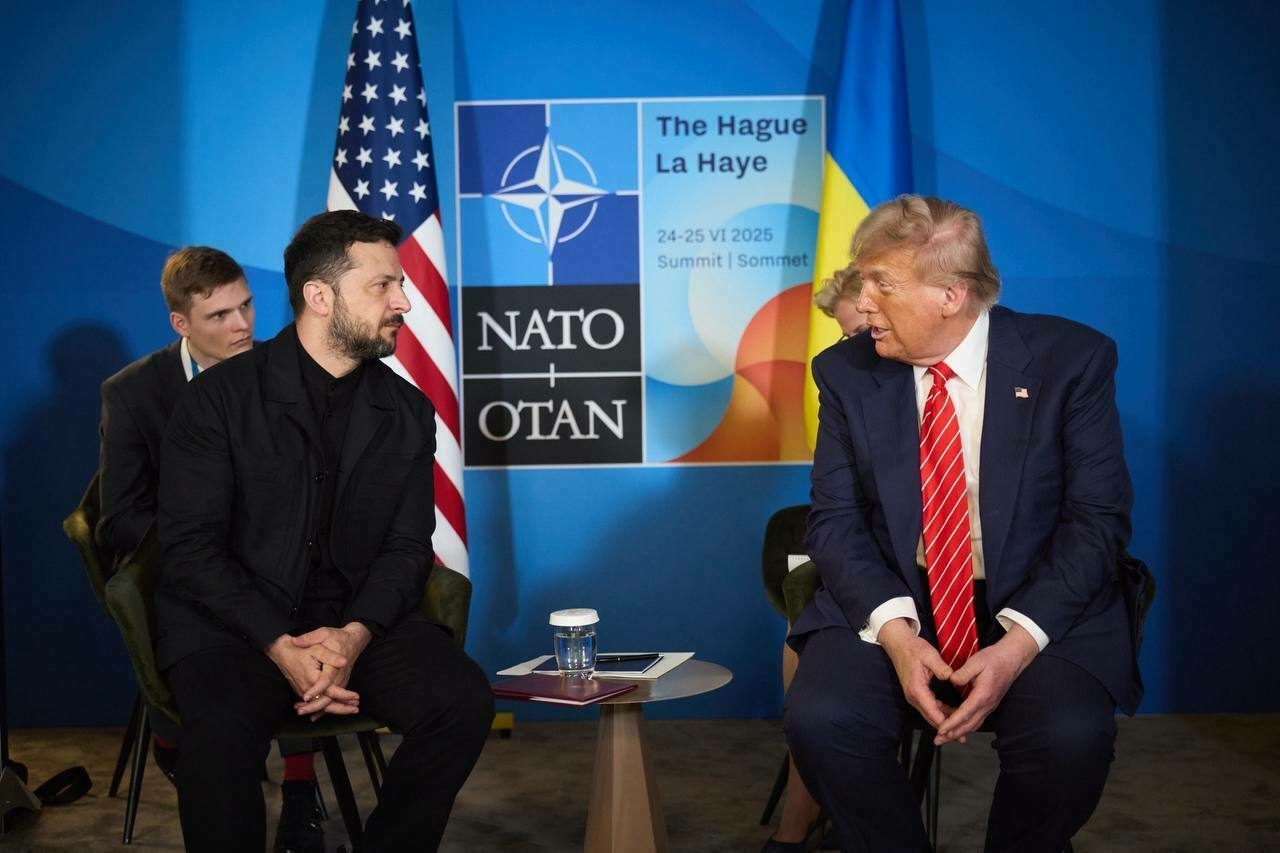
-
NATO allies surprised by Rubio's inconsistency on Russia sanctions, POLITICO reports
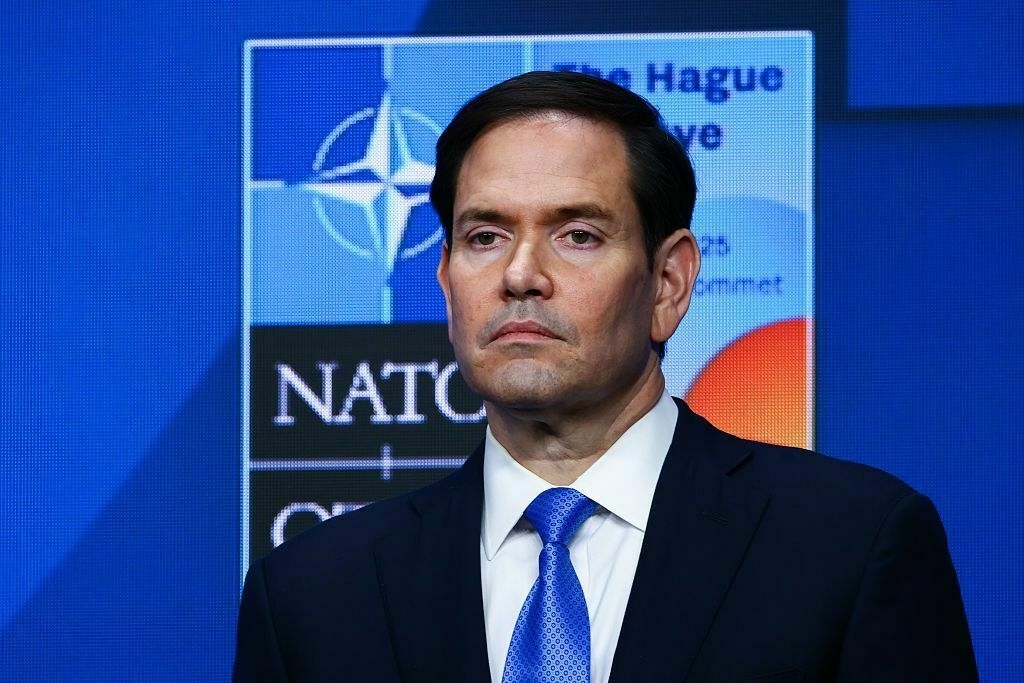
United States Secretary of State Marco Rubio surprised NATO allies this week with conflicting messages on Russia sanctions, delivering a tougher stance in private than in his public remarks, POLITICO reported on June 25.
Rubio met with NATO foreign ministers on June 25 during a private dinner at the alliance’s annual summit. According to sources who spoke with POLITICO, Rubio acknowledged that Russia was the main obstacle preventing peace talks to end the war in Ukraine.
He reportedly said the U.S. Senate would likely consider new sanctions legislation after completing work on President Donald Trump’s spending bill.
However, just hours later, Rubio softened his position on Russia during an exclusive interview with POLITICO, calling for a more cautious approach.
“If we did what everybody here wants us to do, and that is come in and crush them with more sanctions, we probably lose our ability to talk to them about the ceasefire and then who’s talking to them?” Rubio said.
He also added that Trump would know the “time and place” to change course.
When asked about the apparent shift in tone, a senior U.S. official insisted Rubio’s messaging has remained consistent in conversations with allies.
“The secretary has been very consistent in meeting and calls with his counterparts on three key point,” the official said.
“One is that the president believes strongly that the only way this war ends is through negotiations; second, as soon as the U.S. imposes new sanctions on Russia the opportunity for the U.S. to be involved in those negotiations closes; and third, that the Senate, in America anyway, is an independent body that at some point is going to move on those sanctions,."
At the NATO dinner, Rubio reportedly faced criticism from Polish Foreign Minister Radoslaw Sikorski, who claimed that Russian President Vladimir Putin was disrespecting Trump by violating the ceasefire.
It has been more than 100 days since Ukraine agreed to a U.S.-backed complete ceasefire, while Russia continues to reject it.
Sikorski also reportedly denounced Moscow’s repeated attacks on Kyiv and other Ukrainian cities, which have intensified in recent weeks, saying such strikes “should not come for free” — implying that the U.S. and Europe should do more to support Ukraine.
Meanwhile, Rubio has delivered different messages in public and behind closed doors. Despite the shifting rhetoric, Baltic and Nordic countries reportedly view him as a pragmatic ally within the Trump administration — one who has a realistic understanding of the threats posed by Russia and China, according to a second European official cited by POLITICO.
Ukraine war latest: US signals more Patriot missiles for Kyiv after Zelensky-Trump talks at NATO summitKey developments on June 25: * Zelensky, Trump hold talks on NATO summit sidelines * ‘Something unknown’ hits key Russian drone facility in Taganrog, Ukrainian official says * Russia has launched over 28,000 Shahed drones at Ukraine since 2022, with nearly 10% fired in June alone, Zelensky says * Donetsk Oblast city “onThe Kyiv IndependentThe Kyiv Independent news desk
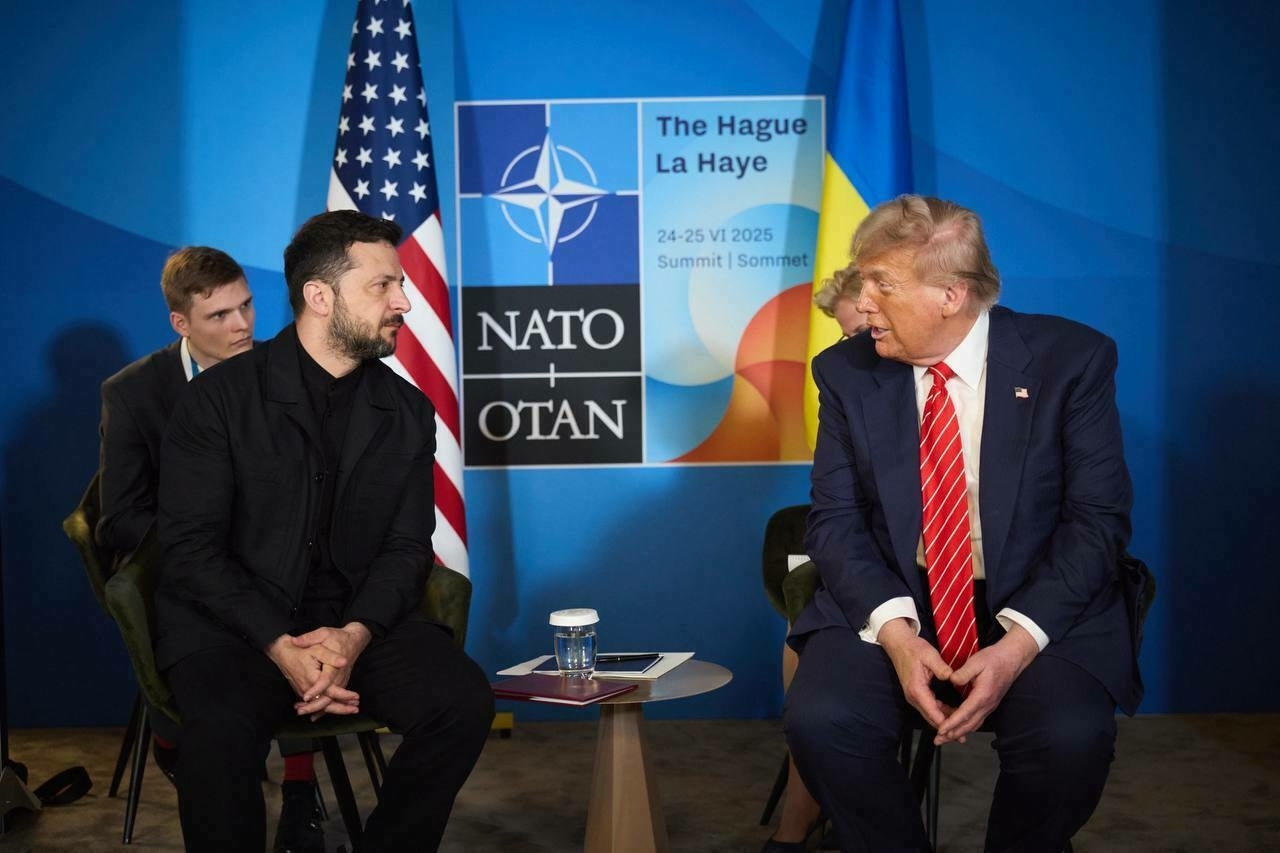
-
Ukraine, Council of Europe sign historic agreement to establish tribunal on Russian aggression
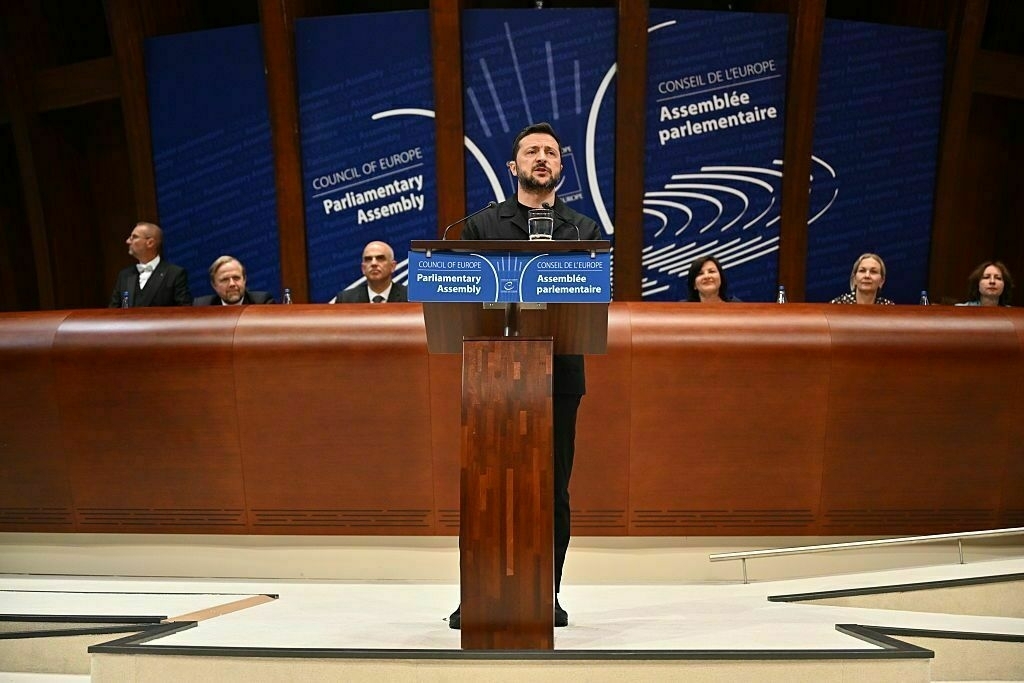
Ukraine and the Council of Europe signed a historic agreement on June 25 to establish a Special Tribunal for the Crime of Aggression , marking a major step toward holding Russia’s leadership accountable for launching the full-scale invasion in 2022.
The agreement was signed by President Volodymyr Zelensky and Council of Europe Secretary General Alain Berset during a ceremony in Strasbourg, France – following more than three years of diplomatic efforts and deliberation.
Speaking at the Parliamentary Assembly of the Council of Europe (PACE), Zelensky thanked the assembly and underscored the importance of justice.
“Everyone responsible for this war must be held to account,” he said. “Every war criminal must face justice – including Putin… the crime of aggression must be recorded, judged, and punished."
Foreign Minister Andrii Sybiha reacted, calling the signing a “historic moment not only for Ukraine, but also for world justice."
The Special Tribunal will be established within the framework of the Council of Europe and will have the mandate to prosecute senior Russian leaders for the crime of aggression – defined as the decision to use armed force against another state, in violation of the United Nations Charter.
The tribunal is intended to close a key legal gap in existing international accountability mechanisms. While the International Criminal Court (ICC) has jurisdiction to investigate war crimes, crimes against humanity, and genocide in Ukraine – it cannot examine the crime of aggression due to jurisdictional constraints. The new tribunal will complement the ICC’s efforts by specifically targeting high-level officials responsible for starting the war.
President Zelensky has long advocated for the creation of the tribunal, emphasizing the need to bring Russian President Vladimir Putin and other senior officials to justice. Ukrainian prosecutors have documented thousands of war crimes committed by Russian forces, including attacks on civilians, cultural landmarks, medical facilities, and reports of torture and forced deportations.
The ICC has already issued arrest warrants for Putin and Maria Lvova-Belova, the Russian official overseeing the forced deportation of Ukrainian children to Russia. While war crimes and crimes against humanity can be prosecuted at any level of command, the crime of aggression focuses exclusively on senior state officials responsible for planning and waging war.
In addition to the special tribunal, the Council of Europe’s Ukraine-related work also includes the Register of Damage, an initiative that has already received more than 34,000 claims detailing losses and harms resulting from Russia’s full-scale invasion. The establishment of the register was a significant international effort and the first step towards a mechanism to ensure justice and compensation for Ukraine and its people.
Zelensky, Trump hold talks on NATO summit sidelines“We covered all the truly important issues,” President Volodymyr Zelensky said. “We discussed how to achieve a ceasefire and a real peace. We spoke about how to protect our people. We appreciate the attention and the readiness to help bring peace closer.”The Kyiv IndependentKateryna Denisova
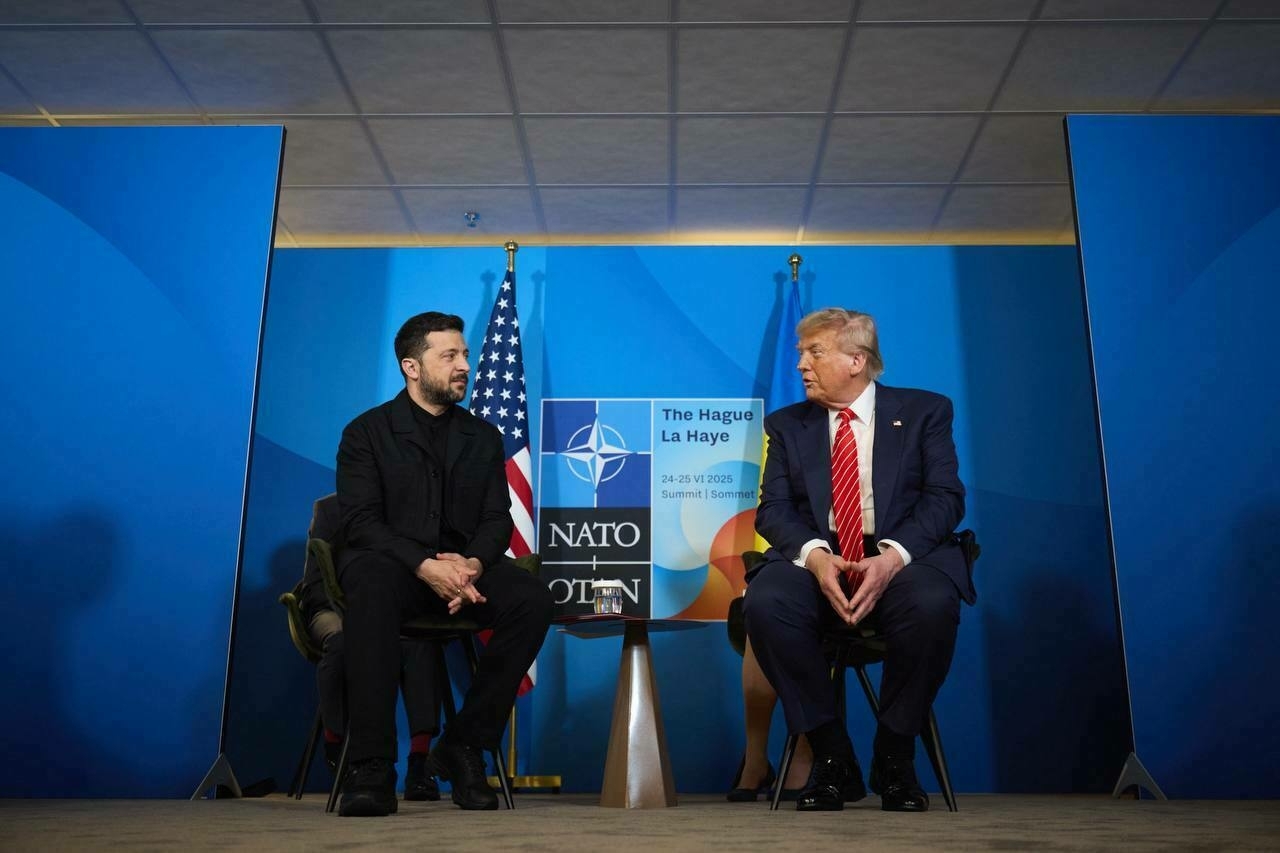
-
Diplomacy or deal-making? Unpacking the U.S.-Belarus prisoner deal
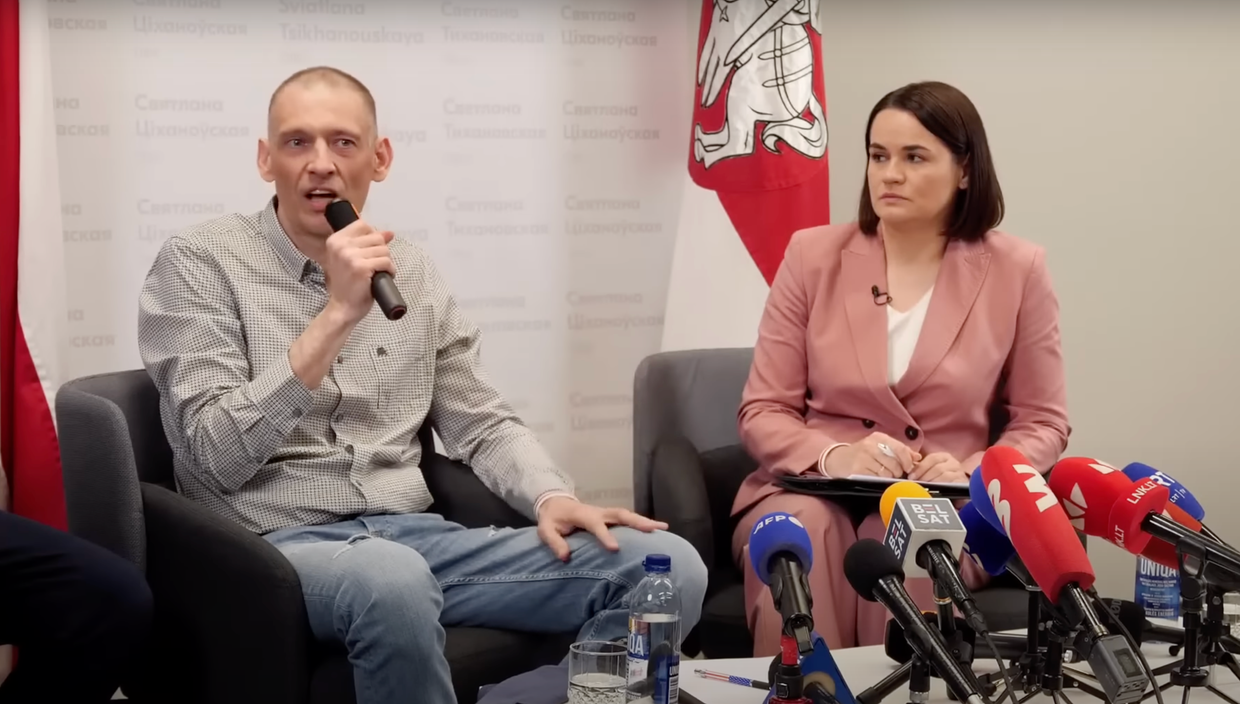
After a high-level U.S. visit to Belarus led to the release of 14 prisoners, observers have been left wondering what autocrat Alexander Lukashenko may have secured in return.
U.S. President Donald Trump’s special envoy to Ukraine and Russia Keith Kellogg’s visit to Minsk on June 21 marked the highest-level diplomatic contact the isolated regime of Alexander Lukashenko had with the U.S. in years.
The trip was also marked by the freeing by the Lukashenko regime of 14 prisoners, including one of the most notable of Lukashenko’s political opponents — Siarhei Tsikhanouski.
With the released prisoners in the spotlight, both parties to the negotiations were vague regarding the results of the meeting. But members of the Belarusian opposition in exile and political analysts all agreed Lukashenko was seeking some form of international legitimacy, as well as sanctions relief.
“For Lukashenko, the visit is a fairly strong legitimizing step,” said Lesia Rudnik, the director of an exiled independent Belarusian think tank, the Center for New Ideas.
“I believe we’re at the beginning of a dialogue … but I think we’ll see a rather slow development of the situation.”
Lukashenko has been ostracized by the West over his support for Russia’s war against Ukraine and brutal suppression of freedoms in Belarus. His international contacts have been limited to China, Vietnam, Iran, and African states that have minimal trade turnover with Belarus, and, increasingly, local Russian officials. The only Western nations that have thus far broken the diplomatic freeze are Russia-sympathetic EU states Hungary and Slovakia.
As for the U.S., analysts suggest Washington could have been looking to deter deeper Belarusian involvement in the war, while also possibly securing a foreign policy win for Trump amid stalled peace negotiations between Kyiv and Moscow.
Carefully choreographed breakthroughThe trail to Kellogg’s top-level meeting in Minsk was blazed nearly a year ago under the administration of former U.S. President Joe Biden, with low-profile behind-the-scenes meetings and occasional prisoner releases.
The most tangible result of Kellogg’s mission was the sudden freeing of 14 prisoners, including Tsikhanouski, former RFE/RL journalist Ihar Karnei, and citizens of Estonia, Latvia, and Poland, who were released from prisons in Belarus and delivered to neighboring Lithuania. U.S. President Donald Trump marked the release with a celebratory post on his social media platform, Truth Social.
“President Trump now has the power and opportunity to free all political prisoners in Belarus just like that. And I ask him to do so.”
Once seen as an unlikely candidate for early release, Tsikhanouski was freed after serving five years of a nearly 20-year sentence. Jailed ahead of Belarus’s 2020 presidential election, his arrest prompted his wife, Sviatlana Tsikhanouskaya, to run in his place. Despite election observers finding she had won the election, Lukashenko claimed victory, sparking mass protests in Belarus that lasted for months.
At a press conference in Vilnius following his release, Tsikhanouski appealed to Trump to help free other political prisoners in Belarus.
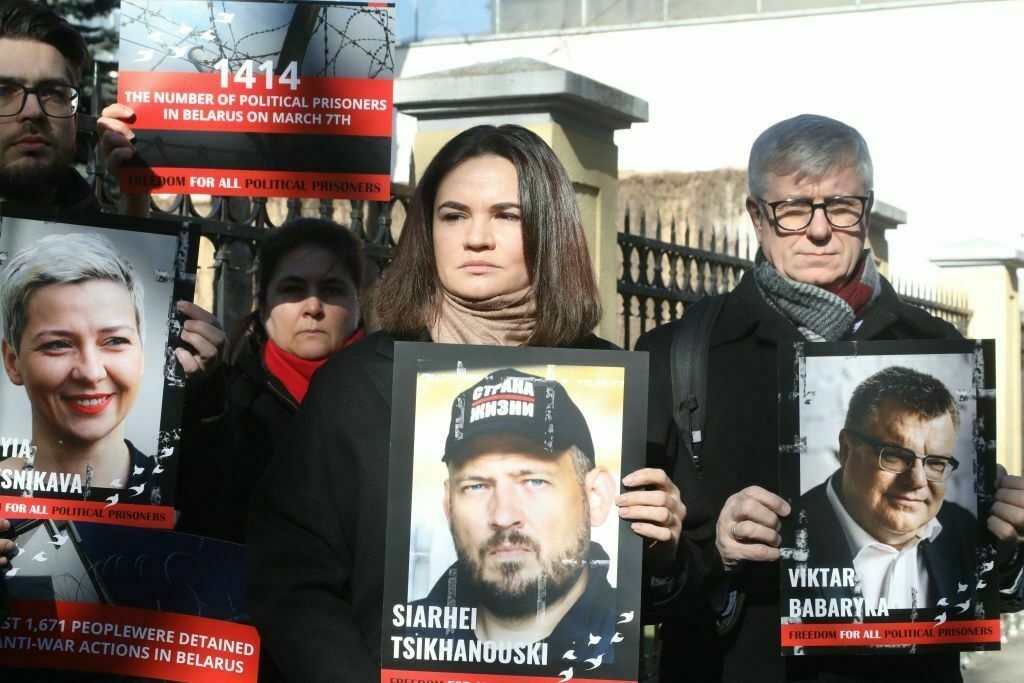
Sviatlana Tsikhanouskaya holds a photo of her jailed husband Siarhei Tsikhanouski as other demonstrators display images of Belarusian opposition figures Maria Kalesnikava and Viktar Babaryka during a protest in front of the Belarusian Embassy in Vilnius, Lithuania, on March 8, 2024. (Petras Malukas / AFP via Getty Images) “President Trump now has the power and opportunity to free all political prisoners in Belarus just like that. And I ask him to do so,” Tsikhanouski said.
Sviatlana Tsikhanouskaya, who, since being forced into exile, has led the Belarusian opposition, hailed the releases, pledging to “continue to work closely with President Trump’s administration and with all our allies on both sides of the Atlantic to achieve the freedom of every political prisoner.”
European leaders, including EU Commission President Ursula von der Leyen, European Parliament President Roberta Metsola, Polish Foreign Minister Radoslaw Sikorski, and others, also welcomed the U.S. diplomatic efforts and the freeing of the political prisoners.
Following four years of continuous, harsh repression, Lukashenko suddenly pardoned 18 political prisoners in July 2024, then continued to release small batches of political prisoners every month for half a year. Tsikhanouski said he had heard talk of his potential release in August 2024.
In February, U.S. Deputy Assistant Secretary of State Christopher W. Smith made an unannounced visit to Belarus, securing the release of a U.S. citizen and two Belarusian political prisoners.
John Coale, Kellogg’s deputy, during a low-profile visit to Minsk in May facilitated the release of dual U.S.-Belarusian citizen Yuras Ziankovich. The earlier contacts paved the way for Kellogg’s high-profile visit, accompanied by Smith and Coale.
The publicity surrounding the visit indicates that the parties “have reached a minimum level of mutual trust,” commented Valery Kavaleuski, a former Belarusian diplomat and ex-member of Tsikhanouskaya’s shadow cabinet. He is currently advocating for the release of political prisoners as the head of the Euro-Atlantic Affairs Agency.
Restoring ties?One thing Belarusian officials did signal was that they expect more in return, including full restoration of bilateral ties and sanctions relief.
Belarus’s permanent representative to the United Nations, Valentin Rybakov, on state-owned Belarusian television after the Kellogg meeting, said that Minsk seeks to “normalize” bilateral relations with the U.S., which would entail the full resumption of embassy operations in both countries and exchanges of visits by officials.
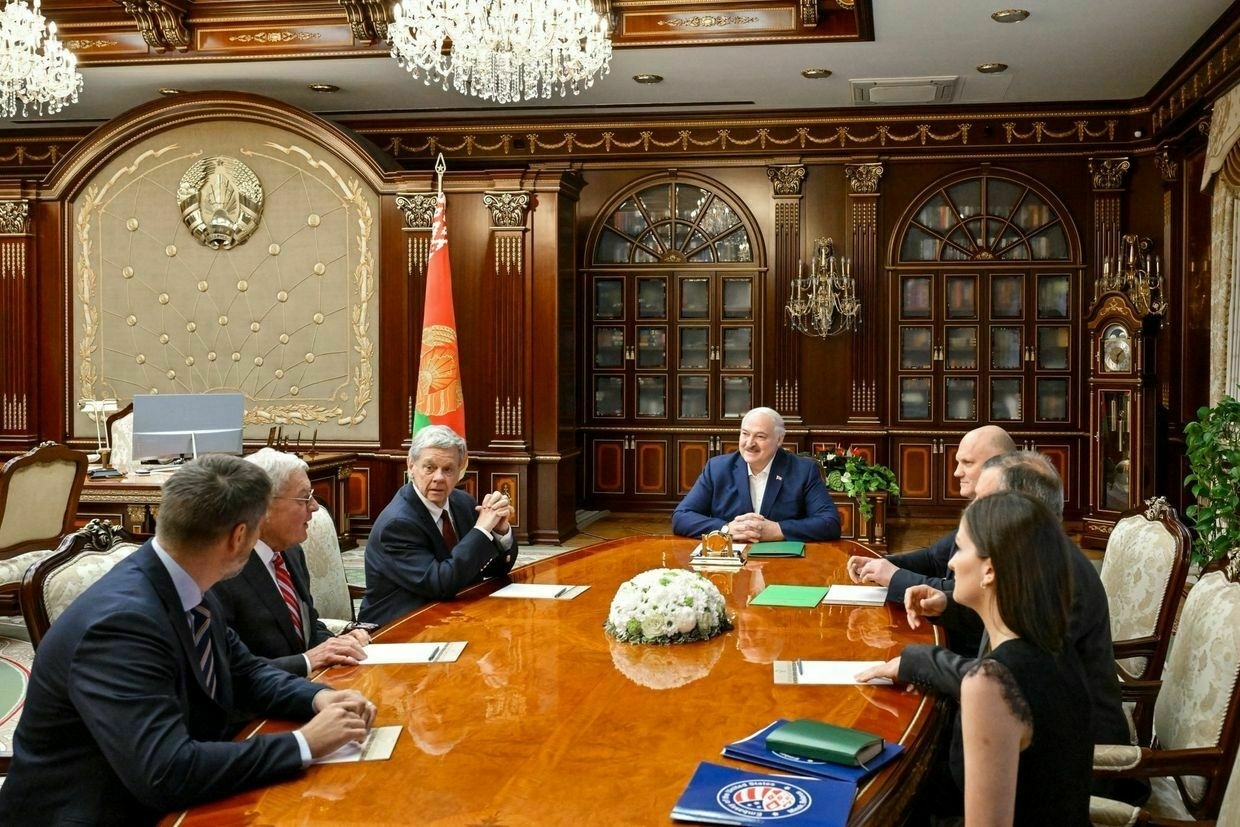
Alexander Lukashenko (C) meets with U.S. presidential envoy Keith Kellogg and members of the American delegation in Minsk, Belarus, on June 21, 2025. (X/Keith Kellogg) The U.S. withdrew its diplomats and shut down embassy operations in Minsk in February 2022, following Russia’s full-scale invasion of Ukraine, which involved the use by the Russian military of Belarusian territory. According to Kavaleuski, the reopening of the embassy lies within U.S. interests in observing and gathering information on the ground. Reopening at the Charge d'Affaires level, as opposed to the ambassadorial level, does not imply any formal recognition of Lukashenko’s legitimacy.
“Without Europe's participation, the ‘de-isolation’ of the Belarusian regime will not be as effective.”
On sanctions relief, Rybakov and Natallia Esismant, Lukashenko’s press secretary, noted that this had been among the priority topics of the discussion. The New York Times also reported that the matter was discussed during Khristopher Smith’s visit to Belarus in February.
“According to our information, Lukashenko is setting a condition for the lifting of the American sanctions on (potash producer) Belaruskali,” opposition activist and leader of the People’s Anti-Crisis Management initiative, Pavel Latushka, told the Kyiv Independent.
“The second is the financial sector, which enables financial payments,” he added. “The third is the Belavia (…) aircraft fleet, which includes (Lukashenko’s) planes.”
In 2019, before Belarus spiraled into political turmoil, potash, its top export, brought in approximately $2.9 billion in export revenues. After the EU and U.S. export restrictions were put in place, Belarus’s share of the global potash market dropped from 18% in 2021 to 8% in 2023, according to the International Food Policy Research Institute. Around 5% of the market was lost in the United States.
“But without Europe's participation, the ‘de-isolation’ of the Belarusian regime will not be as effective,” Rudnik from the Center for New Ideas told the Kyiv Independent, noting that while the U.S. can cancel its own sanctions, Washington would have to lobby for their relief in Europe.
Analysts agree that to restore the flow of this crucial export, Belarus needs to ease European sanctions and overcome opposition from Lithuania, home to Klaipeda seaport, formerly the chief transit hub for Belarusian potash.
Initially introduced in 2021 for human rights abuses, European sanctions on Belarusian potash were re-qualified as sanctions for Minsk’s support for Russia’s war against Ukraine, making them impossible to cancel until the war ends, former diplomat Kavaleuski says, citing his recent exchanges in Brussels.
Belarus, in contrast, expects reciprocal steps and a "good-neighborly approach” after releasing citizens of Estonia, Latvia, and Poland, said Belarus’s KGB Chief Ivan Tsertsel on state-run media, in an apparent reference to European opposition to sanctions relief. Notably, no Lithuanian citizens were included in the release.
But the European Union has so far shown no inclination to reduce restrictions on Lukashenko. Quite the opposite: the 18th sanctions package, recently blocked by Hungary and Slovakia, proposes to ban all transactions with Belarusian banks, further tightening restrictions against Belarus.
"It’s Lukashenko who pushes Belarus closer to Russia because it’s comfortable for him."
And Lithuania, one of the EU member states with the strongest voice on the Belarusian issue, sees no grounds for reconsidering sanctions yet, according to Lithuanian Foreign Minister Kęstutis Budrys. Aware of the potential for a veto by Hungary or Slovakia on Europe-wide sanctions, the Baltic state is developing legislation for national economic sanctions that would provide for the introduction of personal and sectoral restrictions.
While thankful for the release and hopeful for more good news, the Belarusian opposition is cautious about rewarding the regime too soon.
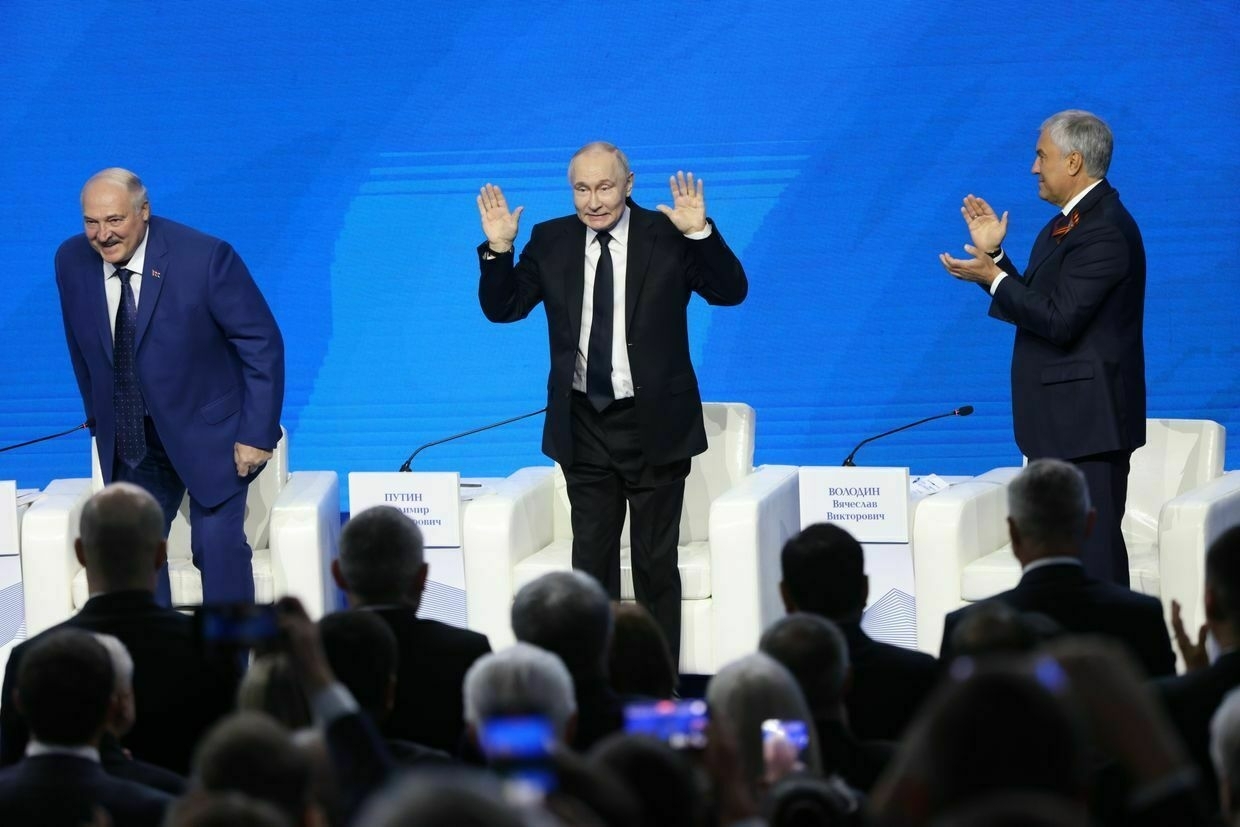
Russian President Vladimir Putin (C), Belarusian President Alexander Lukashenko (L), and State Duma Chairman Vyacheslav Volodin (R) attend the Great Heritage – Common Future Forum in Volgograd, Russia, on April 29, 2025. (Contributor / Getty Images) “Naturally, if the repression stops, and all the prisoners are released, it would open new possibilities, and one could talk about certain relief from the American sanctions,” Tsikhanouskaya’s advisor Viachorka says, adding that at this point, only 1.5% of the country’s 1,100 political prisoners have been released through U.S. mediation.
“There’s no trust in Lukashenko,” said exiled activist Latushka, who is known for his more hawkish approach to contacts with the Lukashenko regime.
“Over the 30 years of his rule, Lukashenko has repeatedly used this scheme of easing sanctions by making cosmetic concessions to the West.”
Latushka argues that sanctions should be eased only after the release of all political prisoners, a halt to repression, and the decriminalization of political life within the country. Even after that, restrictions should be suspended but not cancelled to ensure the possibility of swift reinstatement in case of backsliding by Minsk, he said.
But having released 14 prisoners, Belarusian KGB Chief Tsertsel reported that another 14 foreign and Belarusian citizens had been arrested in Belarus on charges of espionage and high treason in 2025 — in a sign the regime's "conveyor belt" of repression has far from slowed down.
Washington's interest in MinskFollowing his visit to Minsk, Kellogg shared that while his deputy John Coale led discussions on the release of prisoners, he had focused on the Russia-Ukraine War.
“We know Trump is, first and foremost, a dealmaker, and secondly, that success is important to him,” Rudnik said of the interest of the Trump administration in dealing with Belarus.
“And when this does not happen for a long time, especially when he promised so much in his election campaign, it becomes necessary to compensate for the lack of these victories with smaller victories, perhaps even a lot of them,” she said.
Observers interviewed by the Kyiv Independent do not believe Belarus could serve as a credible platform for the stalled Russian-Ukrainian peace negotiations — an idea that has been floated by the Kremlin, but flatly rejected by Ukrainian President Volodymyr Zelensky over Belarus's complicity in the war.
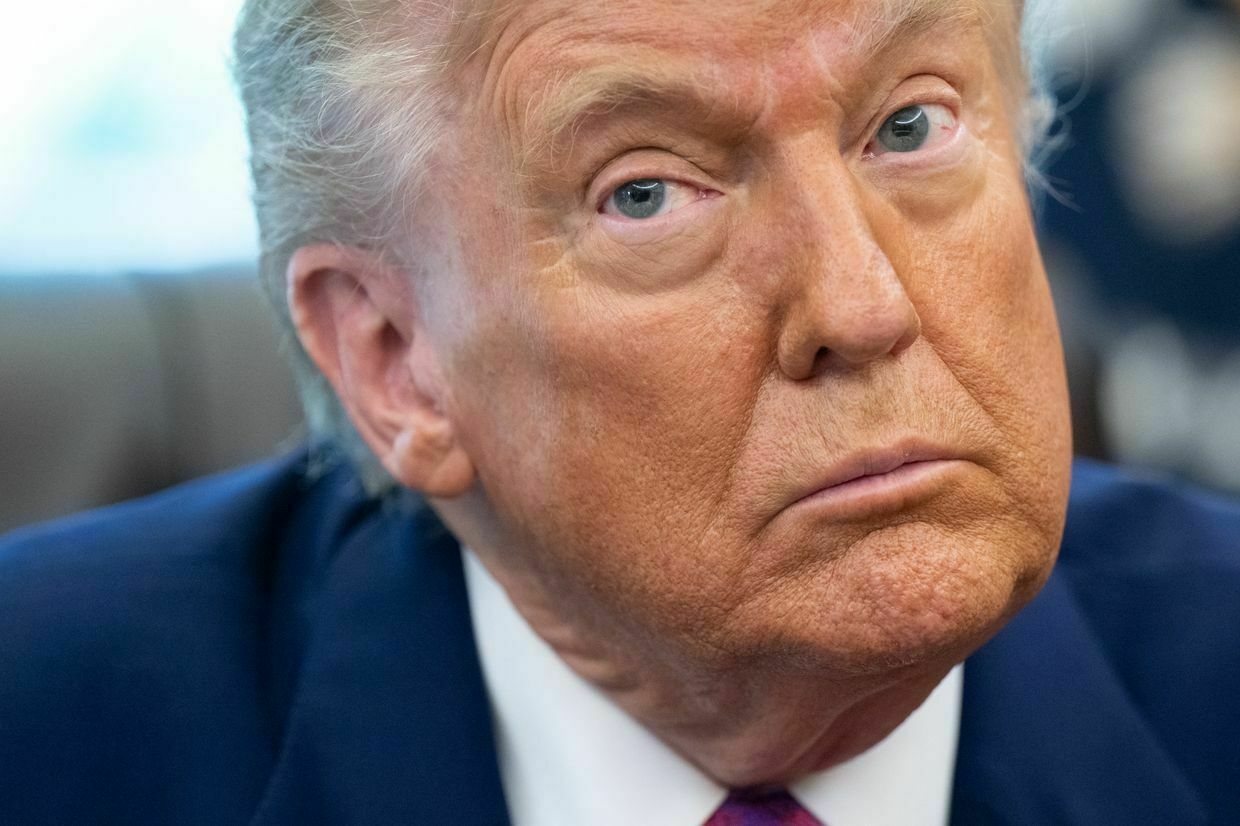
U.S. President Donald Trump at the White House in Washington, DC, on June 10, 2025. (Saul Loeb / AFP via Getty Images) While not having sent his troops into battle in Ukraine, Lukashenko let the Russian army use Belarusian territory to mount attacks on Ukraine at the start of the invasion. He also reoriented the Belarusian military-industrial complex to serve Russian defense contracts, according to a recent report by the Belarusian opposition group Belpol.
Aside from “scoring a win” easier than stopping Russia’s war, Washington may have warned Belarus against becoming more deeply engaged in the Kremlin’s war against Ukraine, or escalating tensions with the NATO and EU member states bordering Belarus, analysts suggest.
“Belarus is strategically placed on NATO’s eastern flank between Russia and western states,” Tsikhanouskaya’s advisor Viachorka says. “The less of a threat Belarus is, the less defense spending for America.”
Belarus is set to host the Zapad-2025 (West 2025) joint military drills with Russia in September. After the Russia-Belarus Union Resolve 2021 drills were used to disguise the buildup of Russian troops ahead of an all-out invasion, any joint drills in Belarus are now seen as a serious cause for concern among its neighbors.
In an apparent effort to assuage those fears, in May, Belarusian Defense Minister Viktar Khrenin announced the drills would involve fewer troops and would be held at a location further from the border.
The Kellogg visit, Latushka believes, also had the aim of determining whether Lukashenko is capable of altering his domestic or foreign policy, and the extent of the Kremlin’s influence over him.
Americanist and advisor to the Euro-Atlantic Affairs Agency Anton Penkovski told the Kyiv Independent that the Trump administration might be considering the possibilities for the “Finlandisation” of Belarus, a term that implies Minsk would loosen its military ties with Moscow without fully breaking off ties.
And while having nothing to lose in the event of negotiations failing, U.S. diplomats might also have been investigating Lukashenko’s ability to act independently and engage in separate negotiations in the event of Russia being weakened.
Indeed, Washington has a history of engaging with Minsk at times when tensions with Moscow heighten.
Viachorka, however, is not so sure.
“We often hear the message that we need to save Lukashenko from Russia, including from Belarusian propaganda,” he says. “But it’s Lukashenko who pushes Belarus closer to Russia because it’s comfortable for him.”
Subscribe to the NewsletterBelarus Weekly<span data-sanitized-id="belarus-weekly-info" data-sanitized-class="belarusWeekly__info"></span> <button data-sanitized-id="belarus-weekly-subscribe-btn" data-sanitized-class="belarusWeekly__form_button"> <span data-sanitized-class="belarusWeekly__form_label">Join us</span> <path d="M4.45953 12.8114H7.90953C8.00052 12.8127 8.09085 12.7958 8.17517 12.7616C8.25949 12.7274 8.3361 12.6766 8.40044 12.6123C8.46478 12.548 8.51556 12.4714 8.54975 12.387C8.58395 12.3027 8.60088 12.2124 8.59953 12.1214C8.58173 11.9269 8.48974 11.7467 8.34265 11.6183C8.19555 11.4898 8.00465 11.4229 7.80953 11.4314H4.45953C4.27653 11.4314 4.10103 11.5041 3.97163 11.6335C3.84223 11.7629 3.76953 11.9384 3.76953 12.1214C3.76953 12.3044 3.84223 12.4799 3.97163 12.6093C4.10103 12.7387 4.27653 12.8114 4.45953 12.8114Z" fill="white"></path> <path d="M8.6 15.0114C8.60135 14.9204 8.58442 14.83 8.55022 14.7457C8.51603 14.6614 8.46525 14.5848 8.40091 14.5205C8.33656 14.4561 8.25996 14.4053 8.17564 14.3711C8.09131 14.3369 8.00098 14.32 7.91 14.3214H2.69C2.507 14.3214 2.3315 14.3941 2.2021 14.5235C2.0727 14.6529 2 14.8284 2 15.0114C2 15.1944 2.0727 15.3699 2.2021 15.4993C2.3315 15.6287 2.507 15.7014 2.69 15.7014H7.81C8.00511 15.7099 8.19602 15.643 8.34311 15.5145C8.49021 15.386 8.5822 15.2058 8.6 15.0114Z" fill="white"></path> <path d="M24.4202 6.01122H7.55022C7.43403 5.99626 7.31641 5.99626 7.20022 6.01122L7.08022 6.06122C6.85578 6.16602 6.66595 6.33276 6.53308 6.54181C6.4002 6.75086 6.32982 6.99352 6.33022 7.24122C6.32744 7.43266 6.36832 7.62222 6.44976 7.79549C6.5312 7.96876 6.65105 8.1212 6.80022 8.24122L12.5802 13.4512L6.89022 18.7112C6.71923 18.8375 6.57973 19.0016 6.4826 19.1907C6.38546 19.3797 6.33331 19.5887 6.33022 19.8012C6.32652 20.0535 6.3952 20.3015 6.52812 20.516C6.66105 20.7304 6.85264 20.9023 7.08022 21.0112C7.14691 21.0484 7.21729 21.0786 7.29022 21.1012C7.46476 21.1609 7.64625 21.1979 7.83022 21.2112H24.5102C24.8263 21.2048 25.1378 21.1355 25.4268 21.0074C25.7158 20.8792 25.9763 20.6948 26.1932 20.4648C26.4101 20.2349 26.579 19.9641 26.6901 19.6681C26.8012 19.3722 26.8522 19.0571 26.8402 18.7412V8.47122C26.8278 7.82952 26.5701 7.21694 26.12 6.7594C25.6699 6.30185 25.0616 6.03412 24.4202 6.01122ZM8.57022 8.08122L7.92022 7.49122H24.4202L16.4902 14.6812C16.407 14.7305 16.312 14.7565 16.2152 14.7565C16.1185 14.7565 16.0235 14.7305 15.9402 14.6812L8.57022 8.08122ZM7.73022 19.7912L8.48022 19.1112L13.4802 14.5812L14.8802 15.8612C15.1804 16.157 15.5793 16.3315 16.0002 16.3512C16.4212 16.3315 16.82 16.157 17.1202 15.8612L18.5202 14.5812L24.2002 19.8012H7.73022V19.7912ZM25.3502 18.7112L19.6602 13.5912L25.3502 8.37122V18.7112Z" fill="white"></path> </button> </div>Why Russian economy warnings might be the only thing out of Moscow you can actually believeIn a rare public sign that all is not well in Russia, two high-ranking Moscow officials last week issued separate warnings about the state of the country’s economy. Russian Central Bank Governor Elvira Nabiullina and Economy Minister Maxim Reshetnikov both highlighted that amid the Kremlin’s full-scale war against Ukraine, the tools Moscow once relied on to maintain wartime growth are nearly exhausted. Almost immediately, Russian President Vladimir Putin on June 20 dismissed the concerns, clai The Kyiv IndependentTim Zadorozhnyy
The Kyiv IndependentTim Zadorozhnyy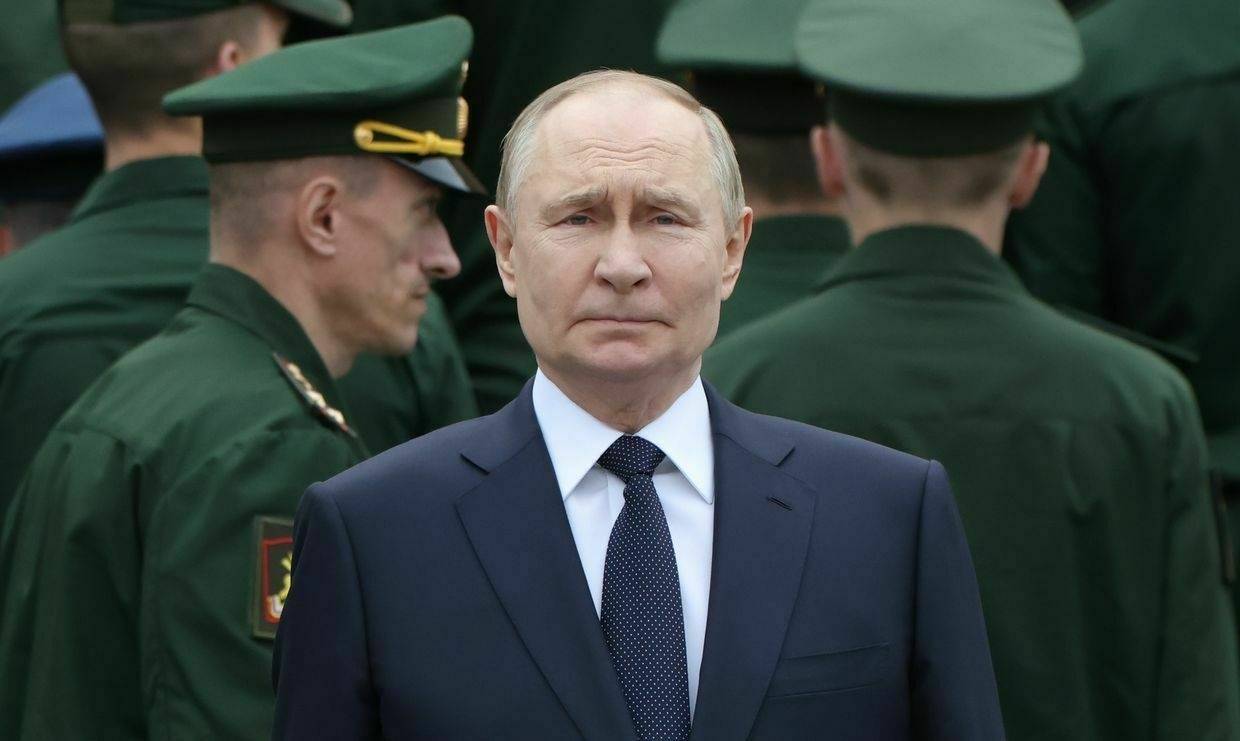
Ukraine war latest: US signals more Patriot missiles for Kyiv after Zelensky-Trump talks at NATO summit
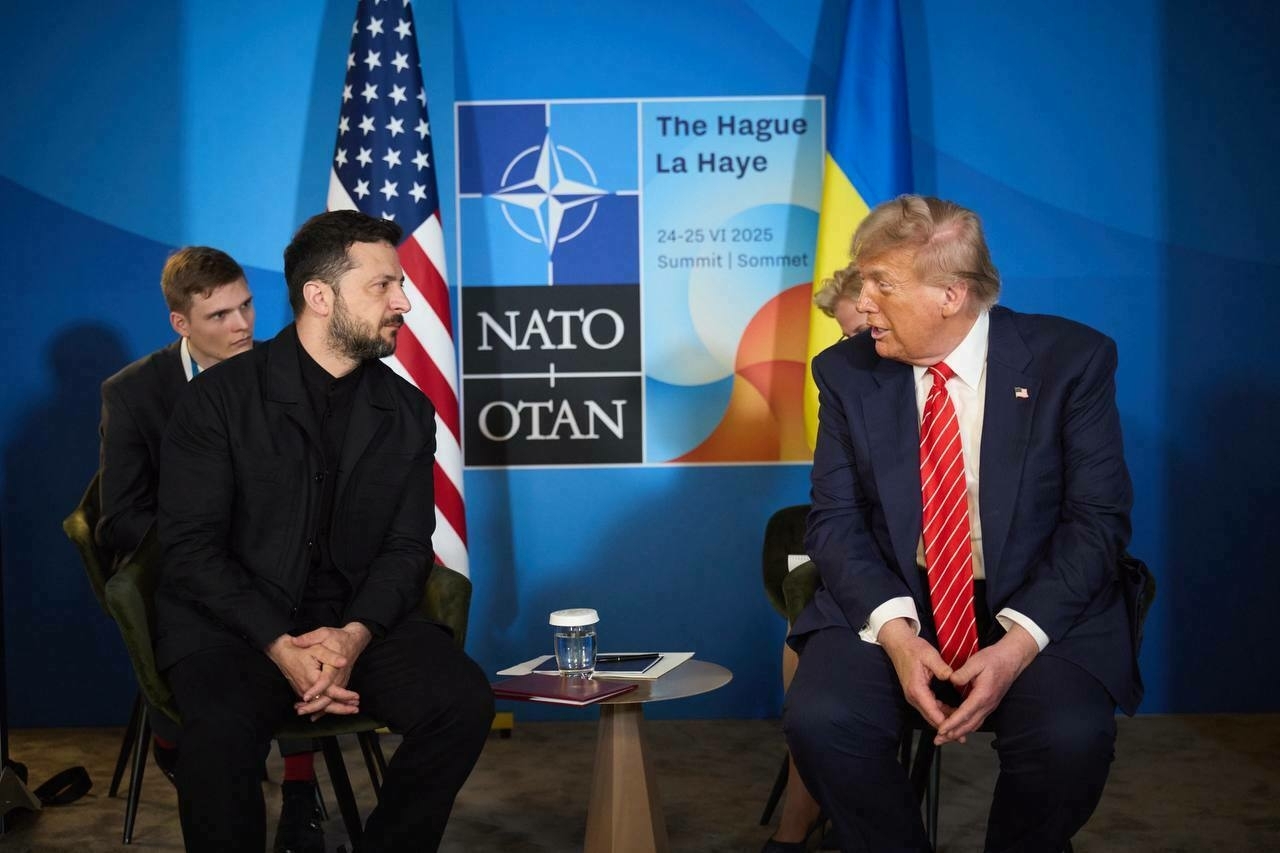
Key developments on June 25:
- Zelensky, Trump hold talks on NATO summit sidelines
- ‘Something unknown’ hits key Russian drone facility in Taganrog, Ukrainian official says
- Russia has launched over 28,000 Shahed drones at Ukraine since 2022, with nearly 10% fired in June alone, Zelensky says
- Donetsk Oblast city “on brink of humanitarian catastrophe,” governor says as drones cripple infrastructure
President Volodymyr Zelensky met with U.S. President Donald Trump at the NATO summit in The Hague on June 25.
The meeting lasted approximately 50 minutes, according to Suspilne. In a post on X, Zelensky described the conversation as “long and substantive."
“We covered all the truly important issues,” he wrote. “We discussed how to achieve a ceasefire and a real peace. We spoke about how to protect our people. We appreciate the attention and the readiness to help bring peace closer."
Zelensky said that he briefed Trump about the situation on the battlefield.
“Putin is definitely not winning,” Ukraine’s president said.
The two leaders also discussed the purchase of American air defense systems as well as the potential for co-production of drones.
“Ukraine is ready to buy this equipment and support American weapons manufacturers,” Zelensky added.
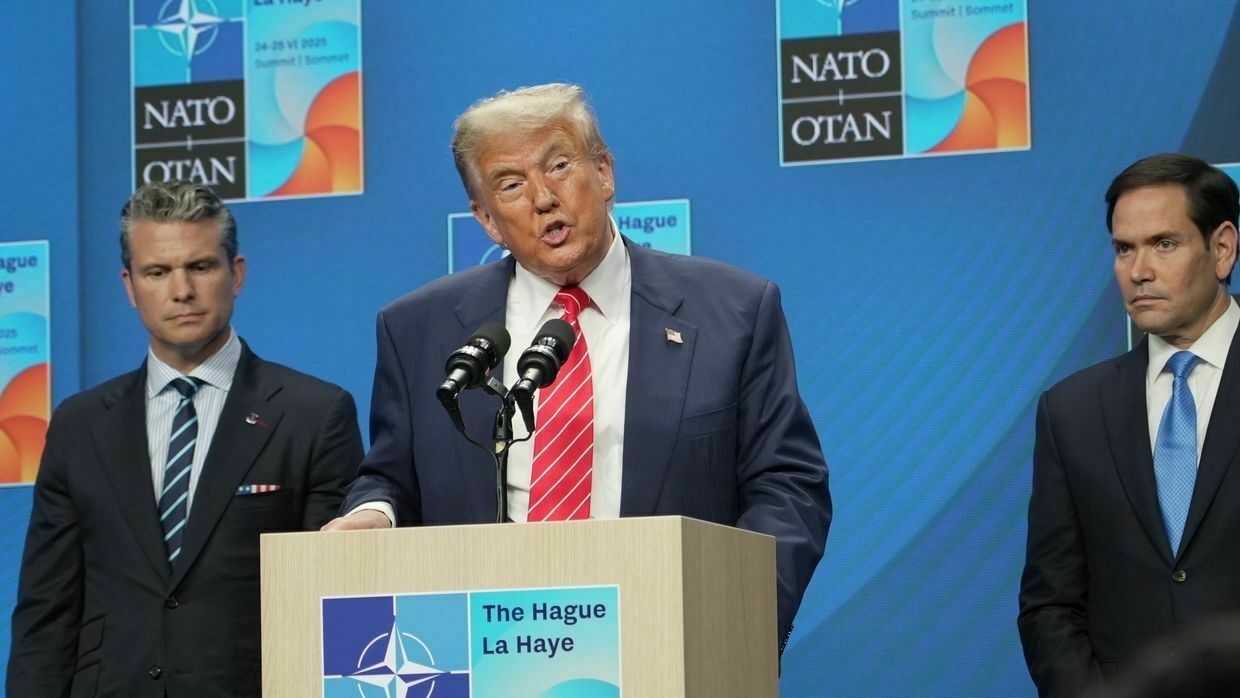
U.S. President Donald Trump speaks to media at the start of the second day of the 2025 NATO Summit in The Hague, Netherlands on June 25, 2025. (Nick Allard/The Kyiv Independent) Speaking at a press conference following the meeting, Trump said that it “couldn’t have been nicer."
“I think it’s a great time to end it (war). I’m going to speak to Vladimir Putin, see if we can get it ended,” Trump said. “He (Zelensky) is fighting a brave battle, it’s a tough battle."
He also signaled support for sending to Kyiv additional missiles for its Patriot air defense systems.
“They (Ukraine) do want to have the anti missiles, as they call them, the Patriots, and we’re going to see if we can make some available,” Trump said.
“They are very hard to get. We need them too. We are supplying them for Israel, and they are very effective."
NATO member states have agreed to a new defense spending benchmark, committing to allocate 5% of their gross domestic product annually to defense and security-related expenditures by 2035.
Unlike in previous years, this year’s NATO statement does not include a direct condemnation of Russia’s actions, unlike the communique issued during the 2024 NATO summit in Washington, which explicitly condemned Russia’s full-scale invasion of Ukraine.
But the leaders reaffirmed support for Ukraine, stating that direct contributions to Ukraine’s defense and industrial capacity will be counted toward the 5% total.
With Trump disengaged and EU complacent, Ukrainian reforms lose momentumRussia’s all-out war has accelerated Ukraine’s push to join the European Union and NATO, as well as its dependency on Western loans and aid. Before, these things would have been heavily preconditioned on Ukraine implementing crucial reforms. However, the war has also eased the pressure on Kyiv to carry outThe Kyiv IndependentOleg Sukhov
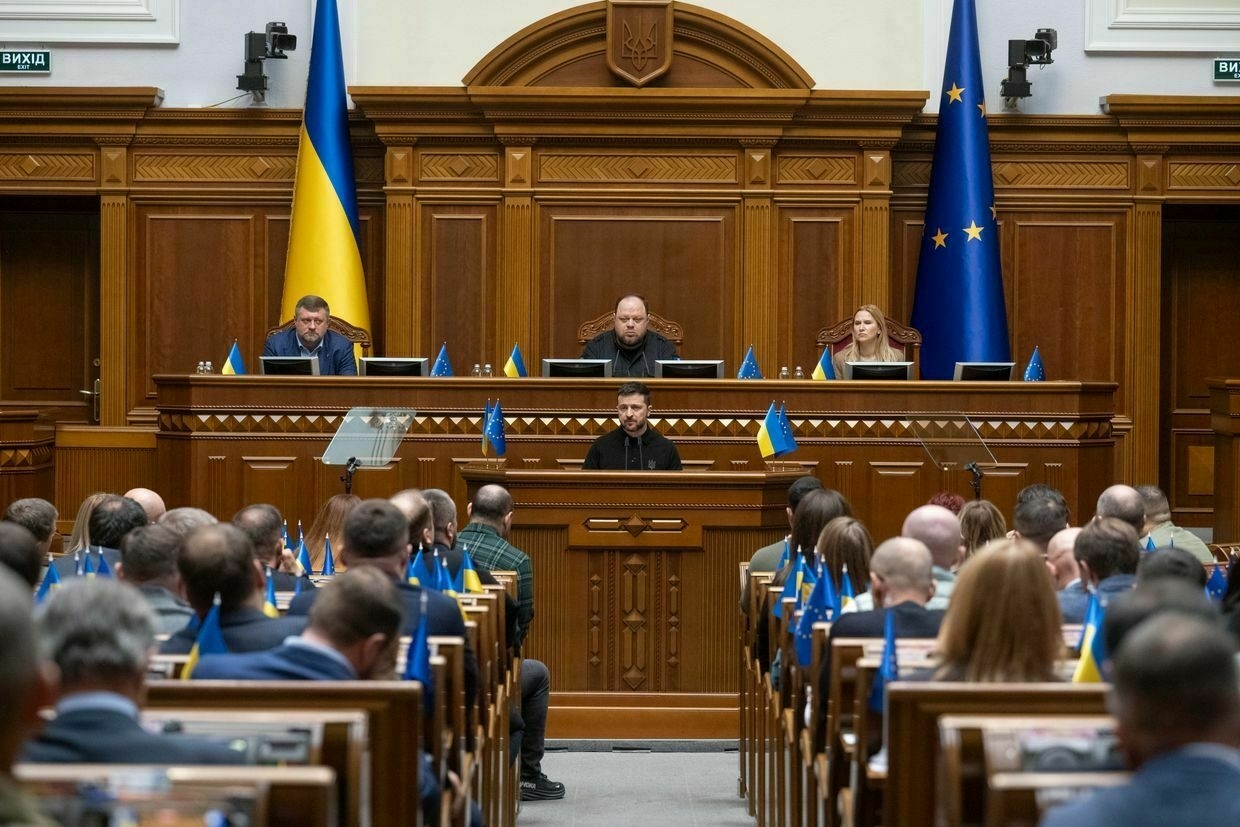
‘Something unknown’ hits key Russian drone facility in Taganrog, Ukrainian official saysA key military-industrial site in the Russian city of Taganrog linked to Moscow’s production of combat drones and electronic warfare systems was damaged overnight, a Ukrainian official said on June 25, amid Russian reports of Ukrainian drones targeting the area.
“Something unknown flew into the Atlant-Aero plant in Taganrog,” Andrii Kovalenko, head of the counter-disinformation center at Ukraine’s National Security and Defense Council said.
“This is an important node in the Russian military-industrial complex, specializing in components for combat drones and control systems."
Kovalenko said the plant is involved in the production of “Orion” drones, electronic warfare complexes, and digital integration systems for strike FPV (first-person-view) drones and loitering munitions.
Russian authorities reported a wave of overnight Ukrainian drone attacks across multiple regions, including Rostov, which borders eastern Ukraine. Russia’s Defense Ministry said its forces shot down 40 Ukrainian drones over several areas, including the Crimean Peninsula and seven over the Rostov region.
Rostov Governor Yuri Slyusar said on Telegram that while there were no casualties, the strikes allegedly caused a fire at a sports complex and damaged a high school and two residential buildings in Taganrog. In nearby Azov, a grain warehouse and industrial facility were hit, he added, without providing further detail.
The Kyiv Independent could not verify the claims.
Why Russian economy warnings might be the only thing out of Moscow you can actually believeIn a rare public sign that all is not well in Russia, two high-ranking Moscow officials last week issued separate warnings about the state of the country’s economy. Russian Central Bank Governor Elvira Nabiullina and Economy Minister Maxim Reshetnikov both highlighted that amid the Kremlin’s full-scale war against Ukraine, the tools Moscow once relied on to maintain wartime growth are nearly exhausted. Almost immediately, Russian President Vladimir Putin on June 20 dismissed the concerns, clai The Kyiv IndependentTim Zadorozhnyy
The Kyiv IndependentTim Zadorozhnyy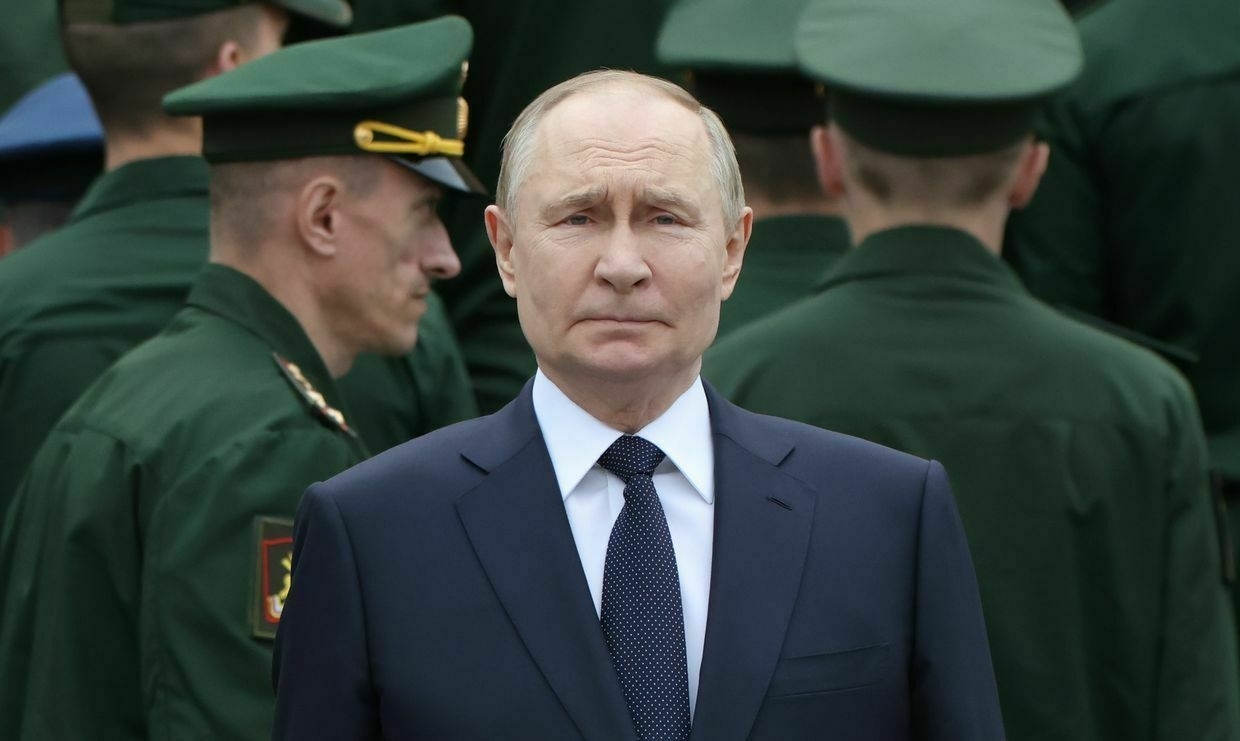
Russia has launched over 28,000 Shahed drones at Ukraine since 2022, with nearly 10% fired in June alone, Zelensky saysSince the start of Russia’s full-scale invasion, Moscow has launched 28,743 Shahed-type drones at Ukraine — with 2,736, or roughly 9.5%, fired in June 2025 alone, President Volodymyr Zelensky said during a speech to the Dutch Parliament in The Hague.
Speaking on June 24, he stressed that Russia would never have been able to carry out such drone attacks without support from Iran, and Ukraine, in turn, could not have intercepted most of the drones without the help of its international partners.
Zelensky called for accountability and emphasized that rules must apply to all — including the Kremlin: “Putin pretends not to understand the rules that shape the modern world. And here, in The Hague, I want to say this very clearly to him: There is a rule — do not kill. There is a rule — do not treat people like beasts. There is a rule — do not destroy cities and villages. There is a rule — do not sponsor terror. There is a rule — do not steal children. And if you break these rules, you will be held accountable."
Investigation: How Russia prepares its strategic missile plant for ‘eternal war’Key findings: * Despite international sanctions, Russia’s strategic missile plant was able to import complex machinery to dramatically increase missile production. * The Kyiv Independent has identified the equipment supplied to the plant, as well as the supply chains, mostly from China. * We located the plant’s new premises, built to house theThe Kyiv IndependentAlisa Yurchenko
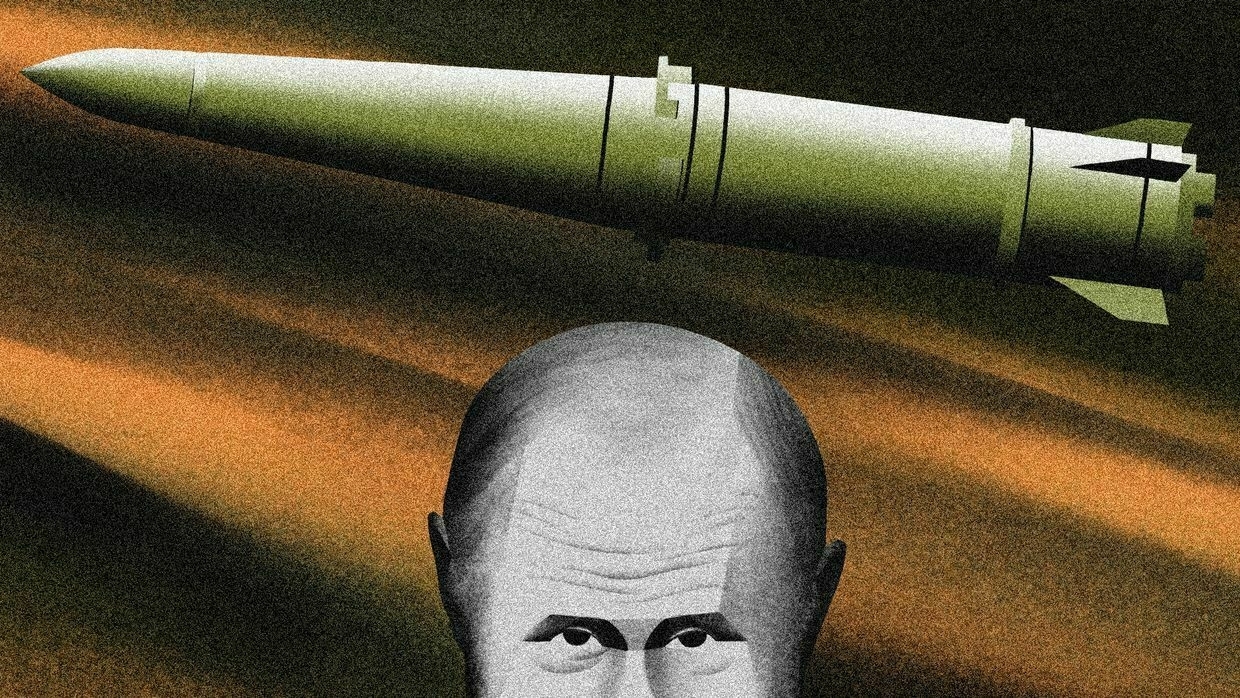
Donetsk Oblast city ‘on brink of humanitarian catastrophe,’ governor says as drones cripple infrastructureThe front-line city of Kostiantynivka in Ukraine’s Donetsk Oblast is facing a looming “humanitarian catastrophe” as ongoing Russian strikes destroy critical infrastructure and leave thousands without basic services, Governor Vadym Filashkin said on June 25.
Kostiantynivka, in eastern Donetsk Oblast, lies just 10 to 15 kilometers (6 to 9 miles) from several areas currently occupied by Russian forces, according to battlefield mapping site DeepState. The city has come under intensified attacks in recent months as Moscow pushes westward beyond its gains around other nearby towns.
According to Filashkin, nearly half the city is without electricity due to shelling, and 1,900 households in the Santurynivka district have no access to gas, with restoration currently impossible. Water is supplied just once a day from 5 p.m. to 8 p.m., meeting only 20–25% of the city’s needs.
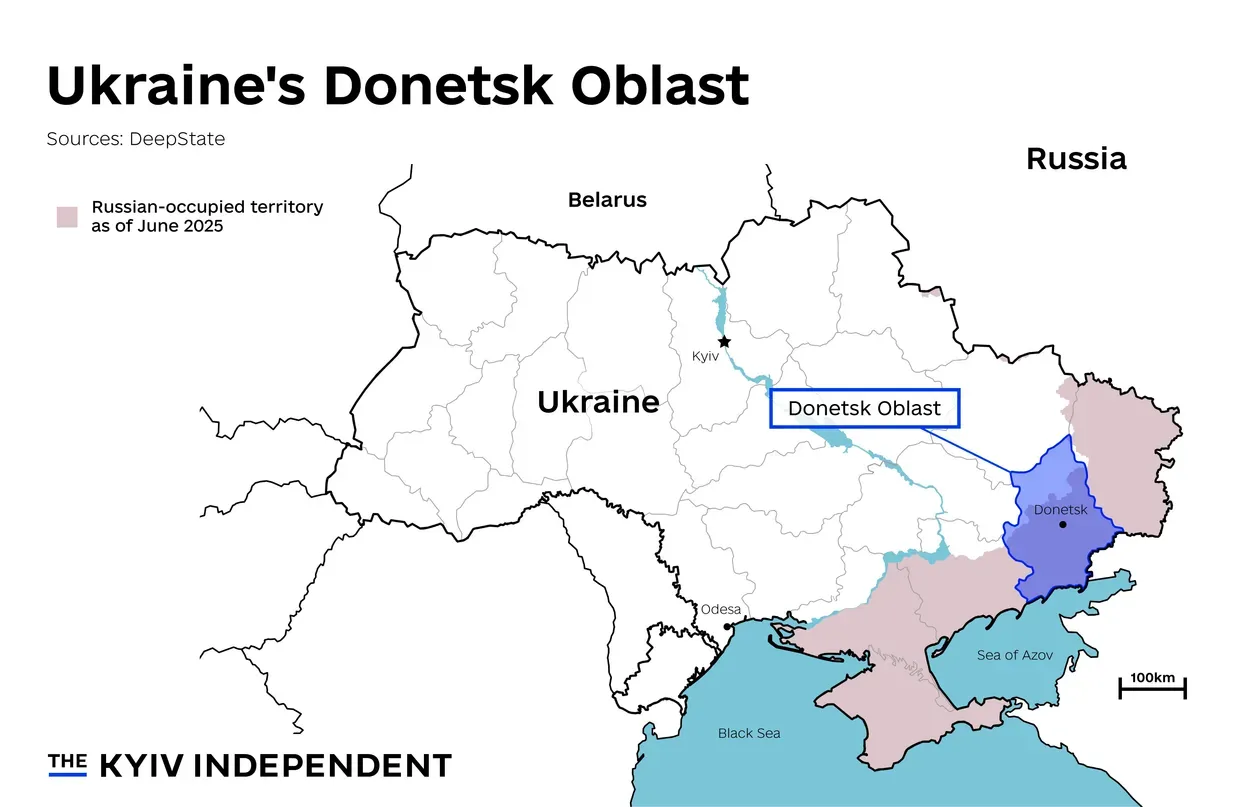
Ukraine’s Donetsk Oblast (Nizar al-Rifai/The Kyiv Independent) Drone strikes have halted all city bus operations, while the suburban route to Druzhkivka, a nearby town, is operating on a limited basis, Filashkin said.
Yevhen Alkhimov, press officer of Ukraine’s 28th Mechanized Brigade, which is fighting near Kostiantynivka, told the Kyiv Independent that “the greatest danger at the moment comes from first person view (FPV) drones, including fiber optic models."
“The enemy is trying to control all logistics and communication routes,” he said, adding: “The Russians’ goal right now is not so much to destroy the city as it is to make it unsuitable for defense by controlling all the roads."
Alkhimov said Russian forces were deliberately targeting vehicles including civilian buses.
“They are trying to fully control all movement in the city using their drones,” he said.
Authorities have installed seven large water tanks and 11 smaller containers throughout the city, in addition to 12 wells, six of which are equipped with filtration systems. Five “Points of Invincibility,” Ukraine’s emergency support hubs, are operational, with two more on standby.
Despite the risks, emergency crews, doctors, utility workers, and local officials continue to work in the city.
“Civilians still remain in the city, and life is becoming more and more difficult for them,” Alkhimov said.
“There are fewer people left, the curfew is now longer, but nonetheless, people are still there, and it is truly very dangerous for them to stay in the city."
Filashkin urged those still in the city to evacuate.
Note from the author:
Ukraine War Latest is put together by the Kyiv Independent news desk team, who keep you informed 24 hours a day, seven days a week. If you value our work and want to ensure we have the resources to continue, join the Kyiv Independent community.
Putin to skip BRICS summit in Brazil due to ICC arrest warrant
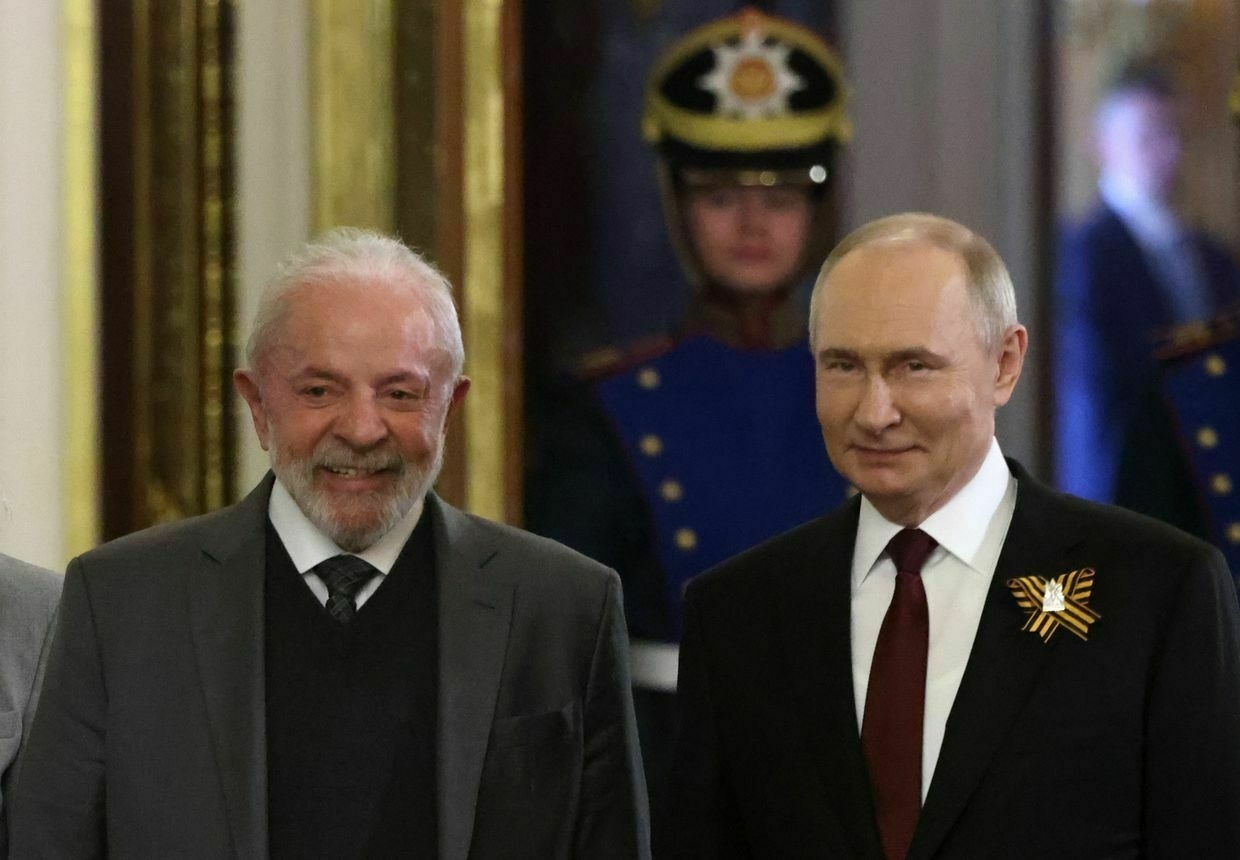
Russian President Vladimir Putin has decided not to attend the upcoming BRICS summit in Brazil due to an arrest warrant issued by the International Criminal Court (ICC), Russian president’s foreign policy aide Yuriy Ushakov said on June 25.
“This is related to certain difficulties in the context of the ICC’s demands, as you know, and precisely in this context, the Brazilian government was unable to take a clear position that would allow our president to participate in this meeting,” Ushakov said.
Brazil is a member of the ICC and a signatory to the Rome Statute, meaning it is obliged to arrest Putin if he enters the country.
The BRICS summit, which is scheduled to take place on July 6–7, will be attended by Russian Foreign Minister Sergey Lavrov, according to Ushakov. Putin is expected to participate remotely via video.
BRICS, composed of Russia, China, India, Brazil, and other nations, is a group of emerging economies often portrayed as a counterweight to the Western-led world.
The ICC issued a warrant for the Russian leader’s arrest in March 2023 over the illegal deportation of Ukrainian children during Russia’s full-scale invasion of Ukraine.
In November 2024, Putin skipped the G20 summit in Brazil and sent Lavrov instead.
Earlier in June, Moscow said that Putin had received an official invitation to attend the G20 summit in South Africa, another ICC member state. The event is scheduled to take place in Johannesburg from Nov. 22 to 23.
In September 2024, Putin made a rare visit to Mongolia, which is also a signatory of the ICC, prompting criticism over the non-enforcement of the warrant.
‘It’s possible’ — Trump on Putin’s territorial ambitions beyond Ukraine“I consider him (Russian President Vladimir Putin) a person I think is misguided,” U.S. President Donald Trump said speaking at a NATO press conference in The Hague on June 25.The Kyiv IndependentKateryna Denisova
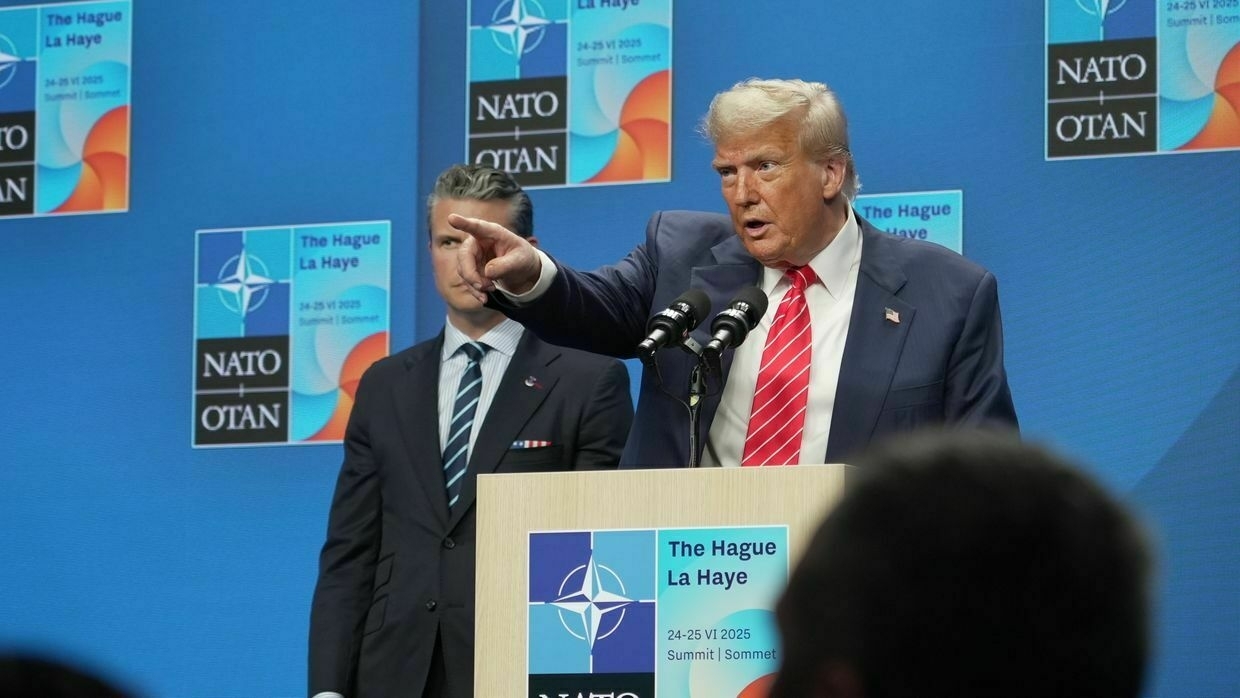
Trump signals support for sending more Patriot missiles to Ukraine
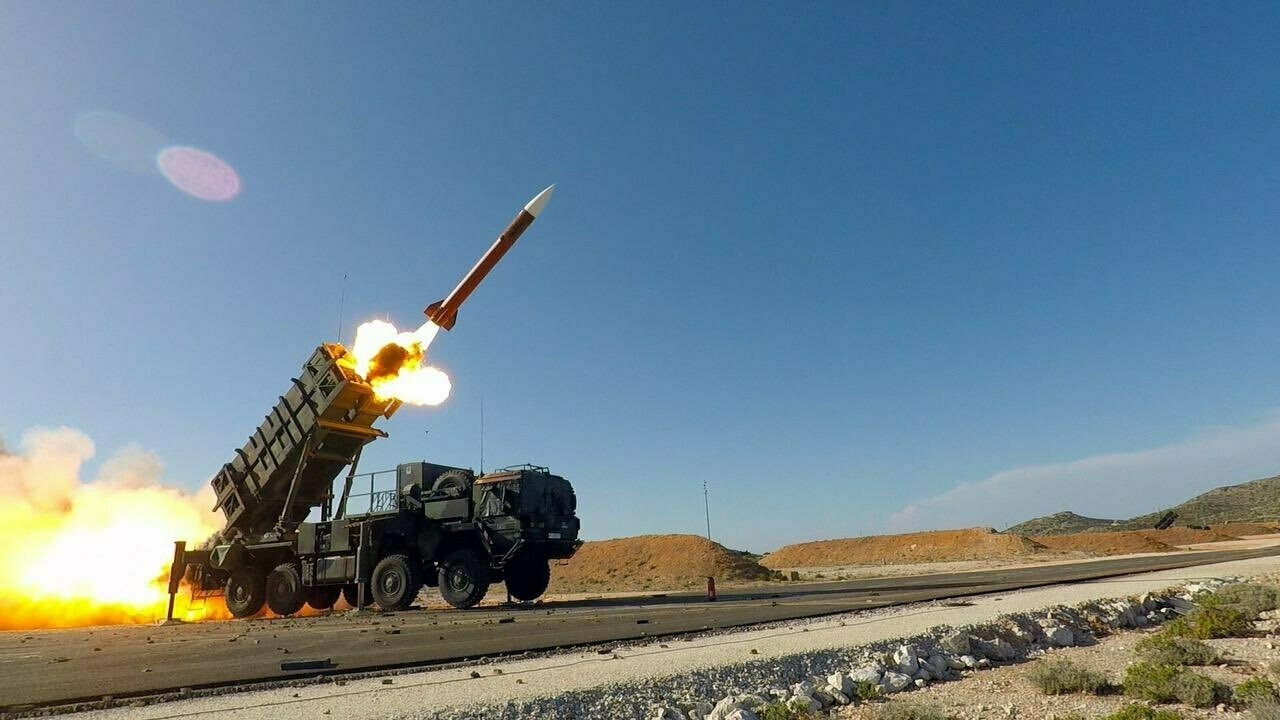
Washington will “see” whether it can supply Kyiv with additional missiles for its Patriot air defense systems, U.S. President Donald Trump said during the NATO summit in The Hague on June 25 as Russia escalates its air strikes against Ukraine.
“They (Ukraine) do want to have the anti missiles, as they call them, the Patriots, and we’re going to see if we can make some available,” Trump said.
“They are very hard to get. We need them too. We are supplying them for Israel, and they are very effective."
After the meeting with Trump earlier in the day, Zelensky said that the two discussed the purchase of American air defense systems to shield Ukrainian cities and critical infrastructure.
In recent weeks, Moscow has intensified its drones and missiles strikes. As NATO leaders gathered for the summit, Russia launched an attack on the city of Dnipro, killing at least 19 people and injuring more than 300 others.
“Ukraine is ready to buy this equipment and support American weapons manufacturers. Europe can help. We also discussed the potential for co-production of drones. We can strengthen each other,” Zelensky added.
Previously, despite Kyiv’s appeals, Trump has dismissed the request, accusing Ukraine’s president of “always looking to purchase missiles” and falsely blaming Ukraine for provoking the war.
The Patriot is a high-precision, U.S.-made surface-to-air missile platform capable of intercepting aircraft, cruise missiles, and ballistic threats. Zelensky has repeatedly said Ukraine needs at least seven more systems to defend its most at-risk regions.
In early June, he confirmed that Trump’s administration diverted 20,000 anti-drone missiles originally intended for Ukraine to American forces in the Middle East.
Since the start of Russia’s full-scale invasion, Moscow has launched 28,743 Shahed-type drones at Ukraine — with 2,736, or roughly 9.5%, fired in June 2025 alone, Zelensky said.
‘It’s possible’ — Trump on Putin’s territorial ambitions beyond Ukraine“I consider him (Russian President Vladimir Putin) a person I think is misguided,” U.S. President Donald Trump said speaking at a NATO press conference in The Hague on June 25.The Kyiv IndependentKateryna Denisova
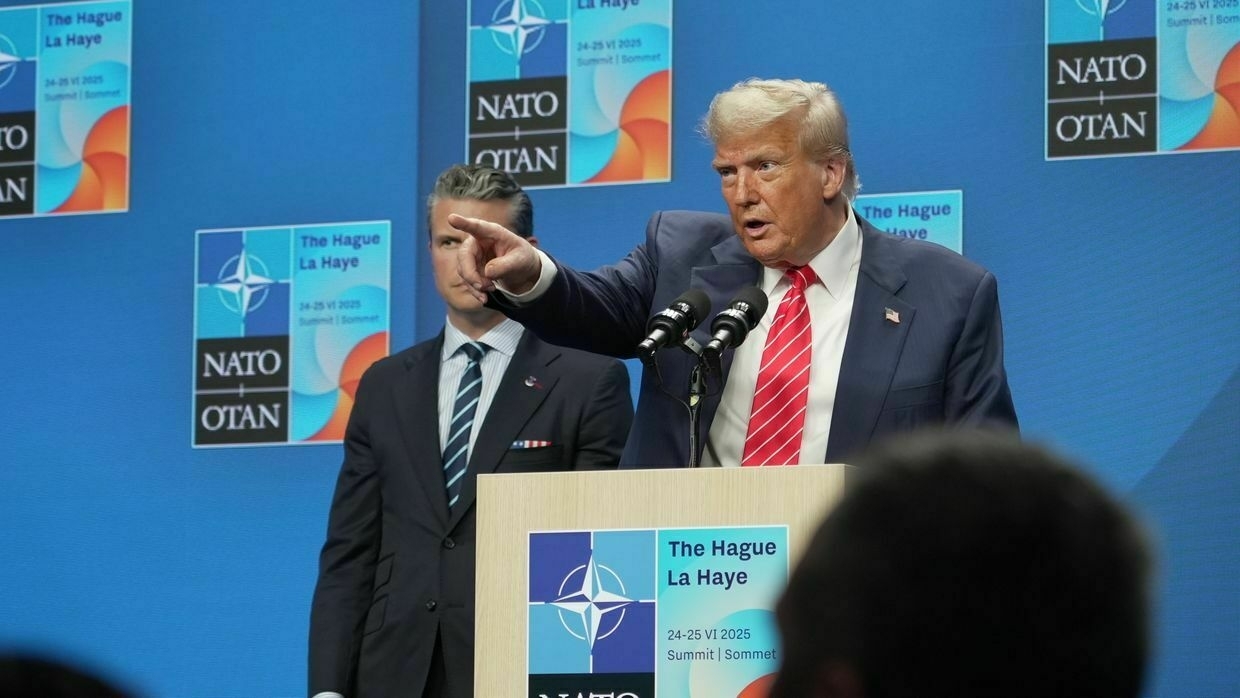
Good сonversation! TRUMP on talking with Zelenskyy at NATO summit